




Ms Wilson - February 2024
THE EARLIER YOU START AND THE MORE ORGANISED YOU ARE, THE GREATER YOUR CHANCE OF SUCCESS.
Reading about how to revise is a good start.
It's best to start revising early, but even if you're reading this a week before your exams, it's not too late for your revision to make a difference
1. to get into a good sixth form or college after your GCSE's to help you one day get your dream job to prove to yourself and others that you can do it
Think about why you want to do well in your exams. It may be:

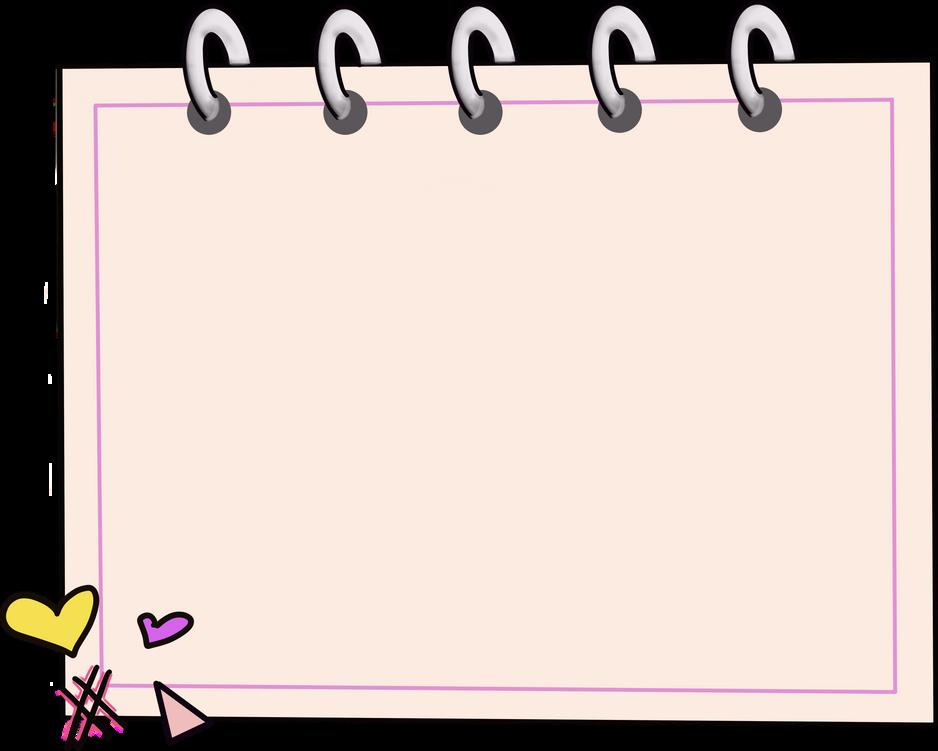
Set small targets with rewards
1. Remind yourself of your long term goals 2. Plan a big treat for after your exams 3 Use a topic planner so you can see the progress you've made 4.
5.
If you're dreading a particular topic, start with some easier topics first
Procrastination means putting off a task that needs doing.
2.
1. You need to avoid procrastination to make the most of your revision time
Turn off your phone, television and other distractions
Give yourself regular breaks - it'll help you keep focused when you're revising.
Break up your revision into small chunks so it's not one endless snog
Start with something small - this will ease you into focusing on your work.
Some things are best when you dive straight in - revision is not one of those things. Making a plan means you can spend more time revising and less time worrying you've forgotten something.
Spend some time on a solid revision plan, but don't spend so long that you don't have time to revise.
You know you have time to cover everything You won't forgot anytopics
You can prioritise early exams or tricky subjects
It reduces stress
It's more efficient.
You'll waste time deciding what to revise each session. You might not allow enough time to revise everything
You can't easily check what you've already revised You may forget some topics
A revision timetable and topic planner will help you schedule your revision and see how you progress. You can find handy versions ready to fill in at the back of this book.
1.
Organise your notes and books for each subject to make it easier to find information
2.
Write a To-Do list, then prioritise which tasks must be done first.
3.
Make sure you have all the necessary stationery so you can crack on with your revision without a fuss.
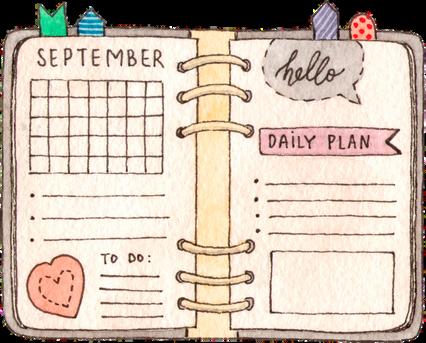
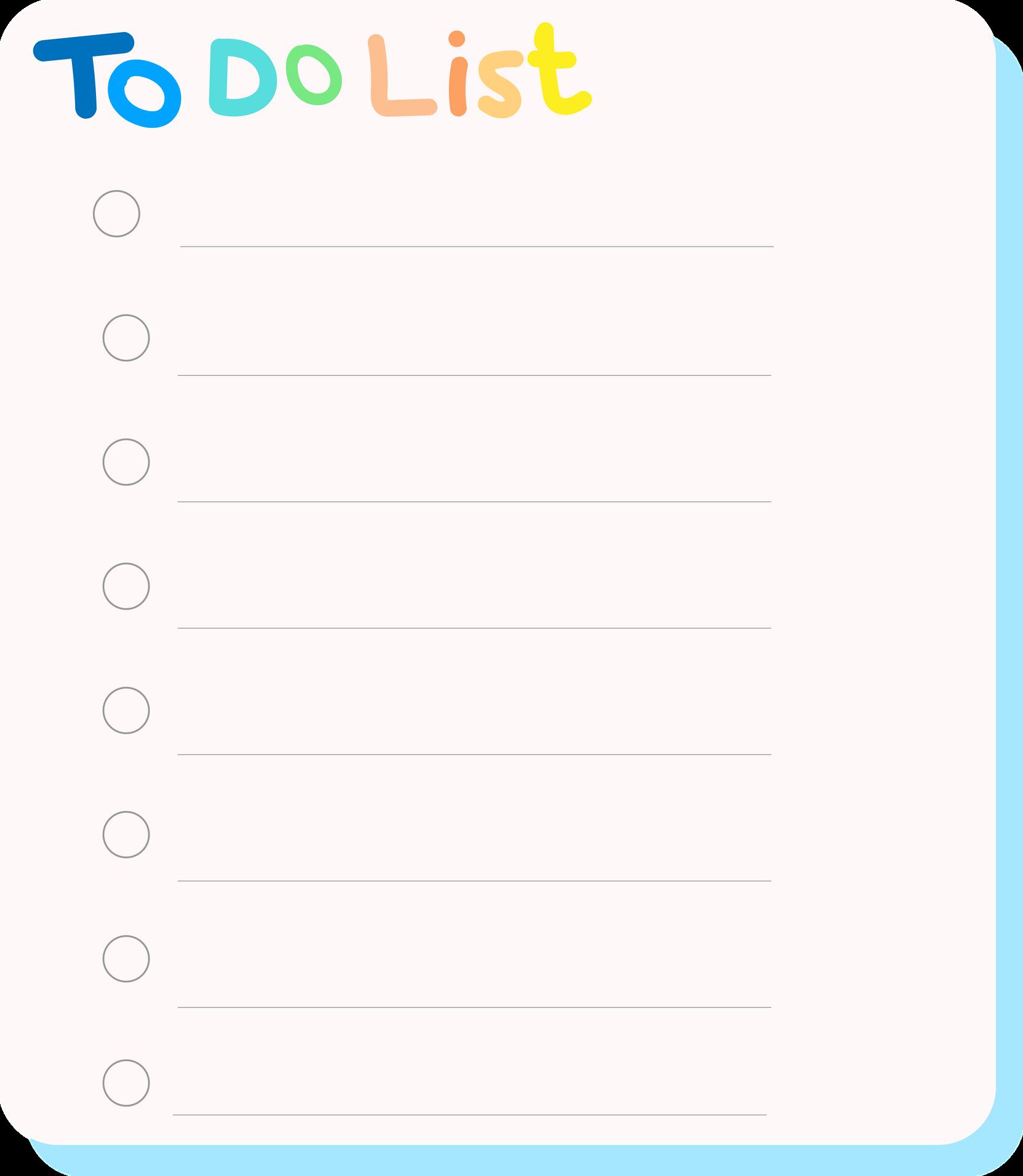
Buy scientific calculator
Tidy desk
Organise my books
Get PE kit ready
Do Maths homework
Remember reading book
Exam periods can be stressful! It is normal to feel nervous when you have an exam coming up. There are ways to cope so stress doesn't affect your revision or your health.
1. A small amount of stress can be good for you - it can motivate you to do better or help you stay focused on working hard until your exams are over.
3.
You won't be alone in feeling under pressure about exams - it's likely your classmates are also finding this time stressful.
2. However, too much stress can negatively impact your health. It's essential to recognise the signs of stress so you can do something about them.

Signs of Stress include
A loss of appetite
Sudden weight loss or gain
Feeling anxious
Difficulty concentrating
Feeling emotional
Struggling to sleep
It is essential to give yourself a break from technology - too much screen time can strain your eyes and affect your sleep.
1. Even spending time away from your screen or study area can help.
2. Set aside time daily to go outside and get some fresh air.
3. Even if you're not working at a screen, it's still important to take breaks from studying to avoid getting a sore back or neck.
6.
4. Exercise can take your mind off things you're worried about 5 Doing just a few stretches can be a good break from work.
Going for a walk, run or short bike ride is a great way to get some fresh air, by yourself or with a friend.
There are lots of indoor workouts to choose fromtry dancing, interval training, sit ups, weights and more.
Yoga and Pilates combine exercise and breathing with meditation which is a great way to relax. Choose an exercise that suits your fitness levelit should be fun!
Make sure your targets for each day are realistic - working in small manageable chunks will help you stay positive
Leave time in the evening to RELAX
- working too late will affect your sleep.
Celebratesmallwins - acknowledgethe progressyouhave made - thiswillkeepyoumotivated.


If you are struggling to stay on track, it might be worth rethinking your schedule to make it better for you
Use distractions such as TV and gaming as a reward for studying - this will help you motivate yourself
Take breaks - this will help you relax and make your studying or revision more effective.

Don't compare yourself to otherseveryone works in different ways. Just focus on what you're doing each day.
Don'tworryifyou're notableto stickto your schedule100%someofthetime-take timeoutfor yourself.
There are apps that block social media and other notifications
These prevent distraction and help you not feel stressed about wasting your time
If you ever feel too stressed (about studying or anything else), remember that you're not alone - talking to someone about how you feel can help you get advice and feel less worried. You could talk to someone you trust - e.g. family member, teachers or your Doctor. You could also arrange a call with a friend and let them know how you're doing - they might also be feeling anxious, so chatting can help you both.
At school, you can talk to the Pastoral team, your Tutors, Head of Year or Senior Leaders -
Pastoral - Mrs Jackson
Tutors - Mr West, Mrs Stonehouse, Mr Forsyth
Head of Year - Miss Rutledge
If you don't feel comfortable talking to someone you know, there are support services and helplines available where you can talk to someone confidentially. Listed below are organisations that work with Chessington School, students can make contact themselves should they need to.
HTTPS://WWW.CHILDLINE.ORG.UK/I NFO-ADVICE/SCHOOL-COLLEGEAND-WORK/SCHOOLCOLLEGE/EXAM-STRESS/ 0800 1111

Deputy Head - Mr Smith LET

Young Minds – provides free, 24/7 support across the UK. If you need urgent help text Shout on 85258, or call: 0800 068 4141
Texts are FREE and answered by trained volunteers 24/7, with support from experienced clinical supervisors. Texts can be anonymous.
Sleep helps you process what you have learnt.

Getting a healthy amount of food and sleep will keep you at peak condition when you're revising and make it easier to take information in.
Sleep helps you process what you have learnt.
Avoid caffeine, strenuous exercise and looking at your phone.

It will disrupt your sleep if it keeps going off.
You'll revise through osmosis. If you don't know what osmosis is, sleep on a biology book tonight...

Yes, even broccoli (honestly, you will grow to like it!)
It makes it difficult to concentrate

Oily fish are great to eat (but hard to catch!)
Make sure you have a water bottle with you at all times.
Keep your energy levels up so you can be the best you can.

Look at the exam board specifications for your subjects from the Summer Exam 2024 timetable. This is on the website here: https://www.chessington.kingston.sch.uk/academic/exam-information
The timetable will tell you the date and whether it is a morning or afternoon exam which will help you plan. It will also tell you how many papers you need to sit for each exam and how long the exam time will be.
Make sure you look at past papers as they will show you the types of questions that could come up.
Find out the Assessment Objectives from the exam boards website
Assessment Objectiveswhat you need to show in your exams
Question Types
Make sure you know which types of questions to expect for each subject.

It is important to know exactly what to aim for to earn those all important marks.
For Maths - remember to show your working out!
Use specific vocabulary and examples where possible (eg, dates / locations in History)
In Science and Maths, make sure answers are realistic and in the correct units.
Check your writing - some humanities exams give marks for SPag.
Be prepared for questions about 'working scientifically' in science exams.
You'll need to know what different questions are asking you to do - that's where the command words come in.
Read the question a few times, or until you understand it
Use the number of marks available as a guide for how long to spend on a question
Underline or circle key phrases and command words
Command words are key - They tell you What to Do
Common Science and Maths commands
Command Meaning
Describe Outline
Suggest
Calculate
Show
Explain
talk through a process or trend state information about... give possible causes for... complete a calculation
prove something is true / false give reasons for something
Common English and Humanities commands
Command Meaning
Discuss
How far do you agree
How important is
How useful is
Use evidence to show
Explain
Example Question:
Calculate the value of 'X'
The command word here is calculate, so you need to work out a value, and remember to show your working out.
talk through a process or trend state information about... give possible causes for... complete a calculation
prove something is true / false give reasons for something
To watch a handy 2 minute YouTube video on COMMAND WORDSscan the QR code
Example: Eat Your Dinner
The command word here is eat.
Example: Find your Shoes
The command word here is find - to look for, search
For lots of subjects, you will have to write longer answers - don't panic!
Take some time to plan your Answers
For each long answer question:
Read the questions carefully
Read every text or source you need to
Check what COMMAND words the text uses.
Remember!!
Don't spend too long planning
Now make a quick plan
Jot down your main ideas
Link your ideas by topic or theme
Outline the structure of your answer
Neatly cross out your plan when finished
You can SMASH IT!
Structure Your Writing
1
2
Use paragraphs to organise your points and link ideas
Link your paragraphs using phrases such as ' on the other hand' and ' in addition to this '
You should aim to Start with a short introduction
End with a brief summar / conclusion that clearly reminds the reader of your main argument
You are writing for an examiner, write properly, avoid informal words (ie John's mate), and don't use any slang or street words, like, my bad, wicked, d'ya know what I mean?
Explain things clearly using phrases like: this signifies that this highlights this suggest that ... furthermore ...
Write Clearly
Don't make your sentences too complicated 1
2
Check you argument is easy to understand
3
Use specific examples and precise quotes
Some GCSE exams give you marks just for the quality of your Spelling, Punctuation and Grammar - so it's worth getting it right!
Avoid spelling mistakes, use punctuation, don't change tense, watch out for double negatives, new paragraphs, new points,
To watch a handy
2 minute YouTube video on LONG ANSWER QUESTIONSscan the QR code
Every so often, exams might hit you with something strange. Don't fear though - help is here!
Sometimes maths problems might be set in a real-life context. This means you have to work out what you need to do before you can do the maths:
Underlining the information you need can help
Evan buys apples in crates of 50 apples. Each costs £22.50
He presses 3 crates of apples every weekday (Mon-Fri) and 2 crates per day at the weekend
How much will it cost Evan to buy enough crates of apples to keep pressing them for 5 weeks?
Use what you've underlined to create the correct calculations for your answer:
If you know certain types of questions are bound to come up, you can be ready for them
In History, you can get questions which ask you to decide how useful a source is - these can be tricky. It might help to ask yourself:
Does any info make the course more / less reliable?
Consider:
Who write it
Who they wrote it for Why they wrote it
Does the source match what you know about the topic?
Compare what you know about the topic with the information in the source
If they don't match, thin about why.
A good chunk of marks are available for calculation questions
Does the source tell the full story?
Consider whether the source leaves out key information
The source may be unreliable if the writer is deliberately trying to hide something.
If you find maths daunting, these things can help:
Show your working out
Check your Answer
Read tables / Graphs carefully
You get marks for it and it can help you spot silly errors
Make sure your answer seems sensible
Double check you ' ve used the correct figures
Now you know what you're aiming for in the exam, put it into practice by doing some practice!
The key to GCSE success is to be well-prepared for the exams. To do this, you need to have a go at answering some exam-style questions
1. Do as many practice papers as youc an. CGP has plenty of practice papers, and you can find past exam papers on ex-board websites
2. Practice papers and past papers also show you how long you'll have for the examthis will give you an idea of how long to spend on each question.
4.
3. When you start answering practice questions, you could use your notes to help you. As the exam gets closer, practice under exam conditions.

Get the right equipment out
Time yourself
Find somewhere quiet, with no distractions
Don't use your revision notes to help you
All practice papers should have mark schemes
These tell you how marks are allocated and how to get the correct answer
Compare the mark scheme to what you wrote Mark yourself, correcting what you got wrong
These tell you what people struggled with and the things examiners look out for
Putting yourself in an examiner ' s shoes helps you see how to improve your answers
Once you ' ve marked your exam and figured out where you went wrong, take a break from it
After a day or so, go back over your notes and then do the same exam again
This helps the right answer stick in your head
If you don't get a high mark at first, don't worry - the idea it to get a bit better each time
This process is super important. You can't revise what you don't understand, or practice what you don't know, so don't skip out steps.
The learning process starts by making notes in class and doing homework, but sometimes you might have to do some extra research too.
Before you start revising a topic, you must ensure you understand it
If there's anything you're not sure about, you could: look back over your notes carefully and read the textbook again. do some research, in the library or online. ask your teacher
F
When you are happy that you understand a topic, you can move on to revise it. Revising is the process of going back over what you've learnt so that you're ready to answer questions on it in an exam
There are many different ways to revise - here are just a few examples: condensing your notes mind maps flow charts flash cards
You can also try techniques to help you remember and retrieve more.
Don't worry if you find something you don't understand - just go back and learn it again.
Once you're happy that you know a topic, it's time to test yourself: You could start by doing some quick fact recall questions and then go on to some practice exam questions. It's essential to do some realistic exam practice - some questions will ask you to apply what you've learnt in different ways so it's good to know you can do this.
If there is something you can't remember go back over your notes and revise it again.
Before you start revising, you need to get your notes together and make sure they're as useful as they can be.
1.
You'll have made notes in many ways - class notes, homework, coursework, independent study etc.
2
Arrange your notes in a sensible way e g have a separate folder for each subject, and split each subject into topics - this will make it easier to keep track of what you've got and find what you need
3.
To make sure you have notes on every topic, check the exam spec. Exam specs should what you need to know or do to perform well in the exam
1. When you write notes, don't just copy things down word for word.
If you're missing notes on a topic, you can find information to fill in the gaps in lots of places - revision guides, textbooks, online resources etc.
2.
3. There is more on how to make effective notes below.
Instead, you should write the key information in your own words. this will help you actively learn the content while you're studying. It will also make your notes easier to understand and refer to
4.
1. Tidy them up and re-write any parts that are particularly confusing.
3
If your notes are hard to read, you won't be able to revise effectively from them.
2. When you fill in the gaps or rewrite notes, try these methods to make your notes as useful as possible.
1.
Splitting your page into different parts means you need to think about what fits where,so it's a great way of checking that understand it.
Divide your page like this:

1.
Indenting lets you organise your notes into main points, sub points and extra info.
start with your main point to the left
Add a sub point indented underneath
Add any extra points for that sub point
Add further information for each extra point
Louis Pasteu (French chemist)
1. 1857: blamed germs for souring of sugar beet in fermenting industrial alcohol
1861: Published his Germ Theory
suggested that microbes in the air caused decay and disease
2 This creates a logical outline of the information and helps you see how different points link together.
3. This method is most effective when you're working at your own pace and have time to plan the structure of your notes
4. It works best for subjects with lots of information, like Biology, History or English Literature. It may not be so helpful for subjects like Maths, where the practice is the key to revision
1.
Whether you're making notes from scratch or tidying up your existing notes, emphasising the most important information is a good idea.
2.
Use a mixture of techniques to do this:
Add subheadings to organise the information
Use highlighting to pick out the most important points. Colour-code information to show links ie. write all definitions in orange.

EXAMPLE You don't need to write in full sentances - just make sure your notes are clear
Theme: Prejudice
Characters who are victims of prejudice: Shylock - Christian characters are hostile towards him. Duke calls him "inhuman wretch"
Jessica - Experiences anti-semitism, even after marrying Lorenzo and becoming Christian.
Characters who are prejudiced
Antonio - He is anti-semitic and would "spit on" Shylock
Shylock - Hates Antonio "for he is a Christian"
Now you notes are neat, it's time to get cracking. You can't learn every word you've ever written, so you need to condense your notes. - these will act as prompts for your main notes.
1.
Simply and summarise your notes into key points so they're easier to revise from.
2. Try to reorganise the material in some way, eg, by grouping or linking differently
Aim to get each topic into a single page. Cut out the waffle, pick out whats important.
3
How you present your notes might depend on the subject.
For example, you could make:
4. Labelled diagrams for Science
A page of key quotes for English Literature
Wind Turbines don't produce pollution in order to generate power, and there are no fuel costs to run them. However, they can be quite noisy for people who live nearby and they don't produce electricity in very strong winds or when there is now wind.
TO WATCH A HANDY
2 MINUTE YOUTUBE VIDEO ON CONDENSING NOTES
- SCAN THE QR CODE
A timeline of key dates for History
A table of formulas and rules for Maths

Organising visually can make it easier to recall in an exam
Identify the key ideas of a topic and find links between them
Colour and images can help topics and information to stick in your mind
A Mind Map is a highly effective way of getting information in and out of your brain - it is a creative and logical means of note-taking and note-making that literally 'maps out' your ideas
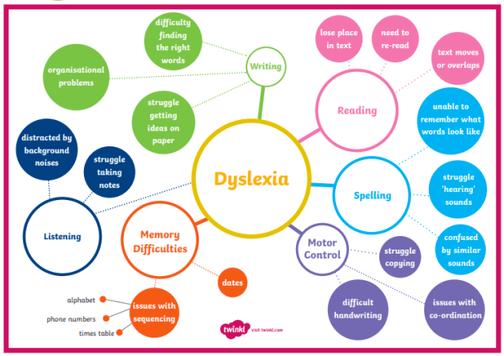
TO WATCH A HANDY
2 MINUTE YOUTUBE VIDEO ON MIND MAPS
- SCAN THE QR CODE
It is also proven that Mind Mapping is helpful for dyslexics and autistic students to better understand concepts and strategies.
Here is an example of a mind map for the poem 'The Man Hunt' by Simon Armitage.
THIS GIVES YOU AN IDEA OF WHERE TO START...

5 Images and colour can help you remember things better.
Effects of war on soldiers PTSD
Laura’s poem wife of solider injured in Bosnia
4 Add details in note form. Don’t make the page too full
half-rhymes disjointed brokenness couplets couple are alone enjambment still some connection
“parachute silk of his punctured lung”
metaphors body = broken objects
Form & Structure Context Themes
‘The Manhunt’ by Simon Armitage
gentle verbs “trace”, “attend”

wife wants to help rebuild him “bind”
1 Write the main topic in the middle of the page...
2 surrounded by sub-topics
“broken ribs”
different injuries / different couplets slow process
3 Then, start to fill in the detail
“punctured lung”
husband psychological scars from experiences “grazed heart”
“buried deep in his mind”

Flow charts are a type of diagram that show a process from beginning to end. They organise information clearly - you can use words and images to show what happens when. It's tempting to spend ages making your flow charts look perfect but as long as they are clear and easy to use, the do not need to be fancy
2.
It might sound obvious, but order is really important in flow charts 1 Write the first step in the process at the top of the page and work downwards.
3.
Flow charts highlight the main steps in a process, but if it helps, you can add key points about the different steps to jog your memorykeep them short and concise though.
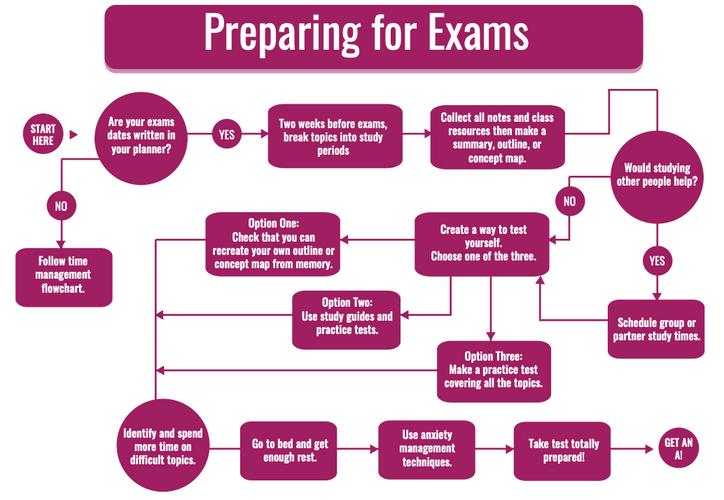
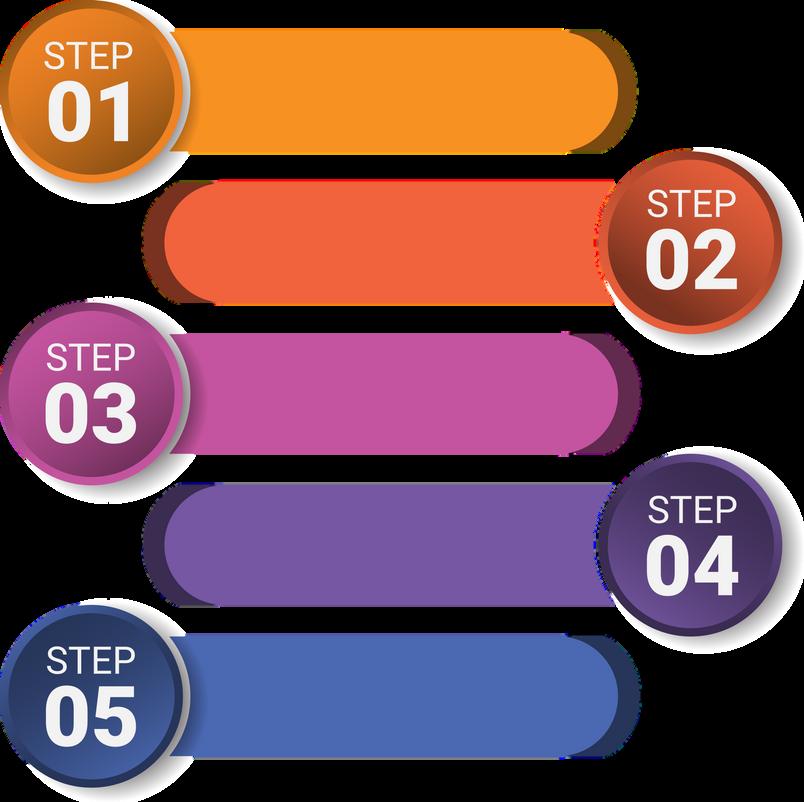
TO WATCH A HANDY
2 MINUTE YOUTUBE VIDEO ON FLOW CHARTS
- SCAN THE QR CODE
Flash cards are one of the simplest, but most effective, revision tools. You might not be able to play solitaire or snap with them, but with a little patience, they'll help you bridge any gaps.
1.
Flash cards are small cards with a question or prompt on one side, and the answer or information on the other side.
2.
They are a great way to test yourself and find gaps in your knowledge.
Flash cards are really useful for: important dates in History language vocabulary key words and definition formulae
labelled diagrams
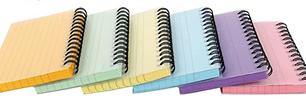
There are a lot of flash cards on sale online but it is a good idea to make your own. Work through your notes and picking out information is part of the revision process.
You can buy revision cards anywhere, and could have different colours for different subjects.
Group your flashcards based on how well you know the content.
Test yourself more often on the groups you struggle with than those you know better.
Ask someone else to test you - it removes the temptation to check the other side before answering.

Say your answers out loud - this forces you to answer the questions properly.
Flashcards are pocket sized - take them where ever you go!
Don't chat while you're revising - it is distracting! Take regular breaks and drink plenty of water. MORE
Test each other on different topics e.g. you could use your flashcards. Try speaking for one minute on a topic, then get your friend to ask you questions about it. Come up with funny pictures or stories to help you remember information. Get creative!

To make your revision as effective as possible, focus on topics you're not so strong on There are a few ways to identify areas to improve on. ask your teachers look at the results of your mock exams to see where you lost marks look at the feedback on the assessments look over homework and see which bits you did less well on ask your friends - especially ones you've worked with on group projects you shouldn't completely ignore topics you feel confident about - it's essential to revise these area's so that they stay fresh in your mind.
Here are a few helpful apps to help with revision. Your subject teacher will be able to give you more detailed app's to use.



Incorporating exercise into your revision routine can pay off because exercise stimulates your brain



You've tried everything to revise and now it's time to test how much you know. Don't worry if you don't do well immediately when testing yourself - it's not the actual exam after all.
For subjects where you'll need to answer multiple long-answer questions, you could try writing an answer to just one long-answer question. This can help you get a feel for how to write longer answers without worrying about answering more than one of these questions in a row or in a certain time limit.
Beforedoingafullpracticepaper, youmayfindithelpfultoget familiarwithexam-style questions.
Try swapping exam answers with a classmate so you can give feedback on each other's work and share ideas This should help you to see what you do well and what you need to work on.
You can also try just planning your answers - doing this for a range of questions will help you to get better at structuring long answers quickly and working out what to cover
Focus on practice questions for the topics you're struggling with or the question types you need to work on. This will help you feel more confident to tackle these questions in the exam.
When you feel ready, apply your knowledge by doing a full past paper.
1. Replicate exam conditions - this will give you a food feel for what it'll be like in the actual exam.
2. Give yourself the same amount of time you will have in the exam.
4.
3. Do it without your notes - this will show you what you know and what you need to revise again.
Once finished, look at the mark scheme to see how well you did:
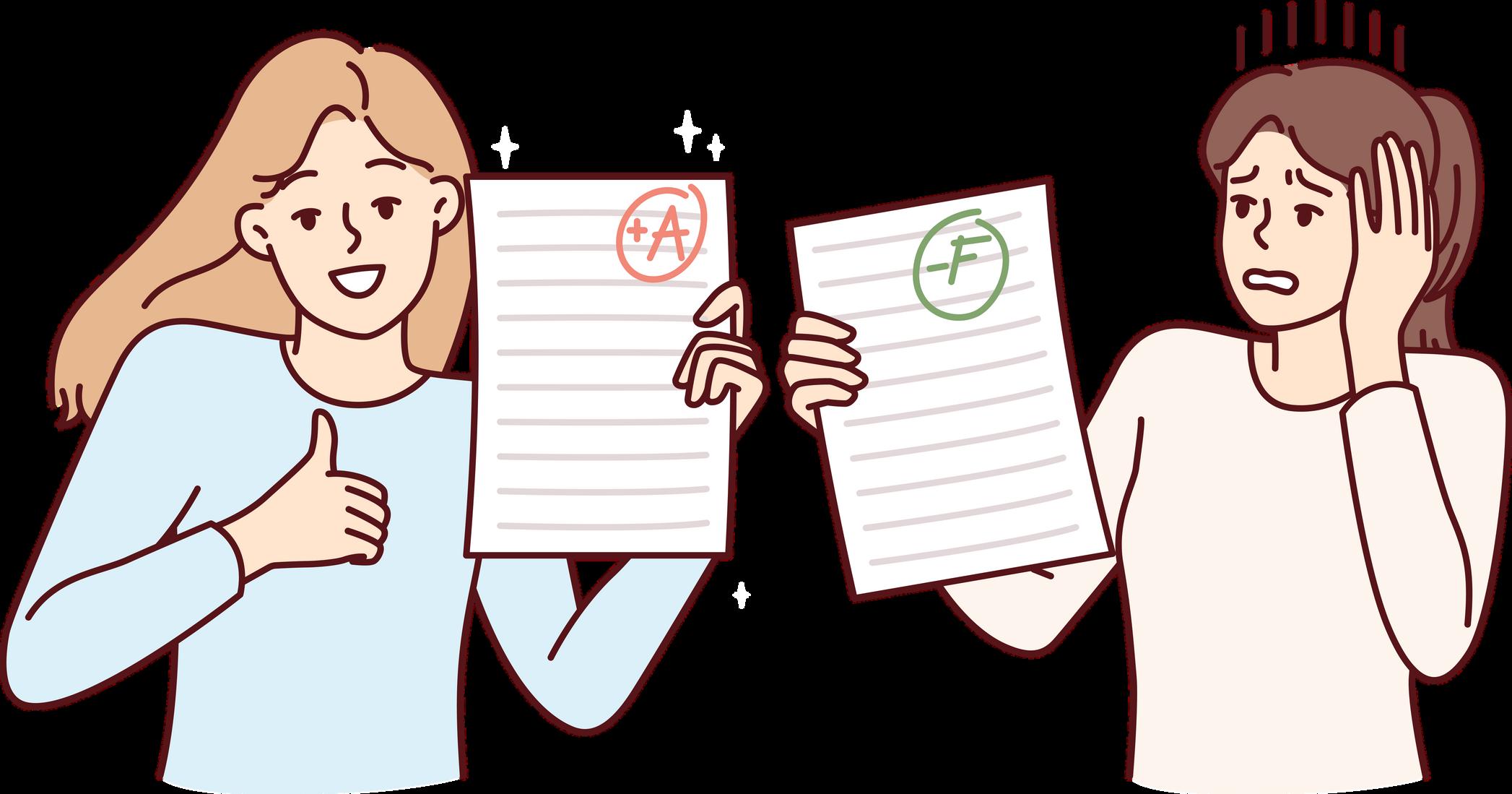
Mark schemes tell you how marks are allocated and can show you how to get the correct answer.
Work through any questions you got wrong - this will help you see what to do next time you get a similar question. You can sometimes get marks for showing your work / working out. Seeing where you have missed marks will help you work out which topics you need to revise more.
Identify the topics that you didn't do well on in the past paper.
After a day or two, revise the tricky topics and then do the past paper again.
If you're still struggling, test yourself on the information again until it sticks!
After you've finished and marked a past paper, it's worth looking at the examiner's report.
1. Examiner's reports tell you what worked well in people's answers - this can give you tips about the kind of things the examiner is looking for.
2. They also tell you what people struggled with in the exam - this can help you avoid common mistakes.
4.
3. You can use this information to guide your answers when you test yourself again. or when it comes to the real exam.
Having a go at practice papers can be stressful, especially if you're not doing as well as you'd like, but try not to panic. The more practice you do, the more familiar you'll become with what to expect in the exam - this should increase your confidence and make things feel less frightening on the day.
Doing a practice paper more than once should hopefully show that you ' ve made some encouraging progress If you don't see any improvement at first, don't worry - just keep revising the topics you ' re struggling with and then give the paper another try.
Will increase your chances. Is the best practice. Makes you more confident.
ADVICE:
Generate lots of ideas for your exam topic in your sketchbook
Link your ideas to the topic.
Remember, good presentation is vital
Include descriptive words, keywords and phrases
Research the minimum of two artists
Explain how the artists link to the exam question/theme, like the theme, style or techniques, because they are interesting and you want to apply them in your work. You will include images and draw examples of their work as well as research and writing using our artist success criteria.
How to get an A in GCSE Art: https://www.youtube.com/watch?v=a5ur9p2G-xE
A* GCSE Exam Sketchbook: https://www.youtube.com/watch?v=ND1Y0rUqB3M
GCSE A* Full marks sketchbook: https://www.youtube.com/watch?v=vJiOyE3qmOo
A* GCSE Art Sketchbook: https://www.youtube.com/watch?v=Vxl6paBnR9c
Develop your own ideas, through drawings, experiments and photography.
How are your ideas linking to your topic and artists?
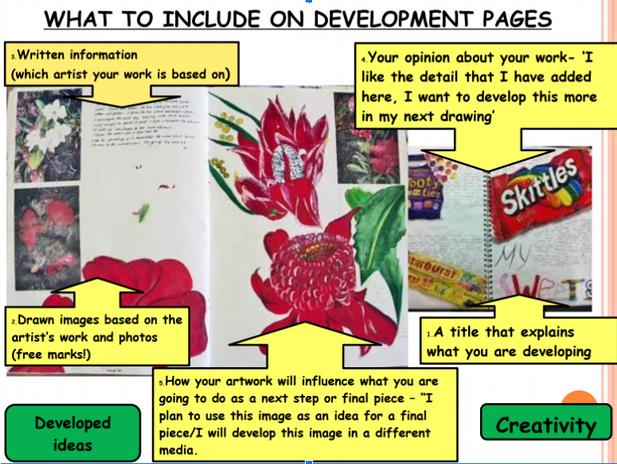


Use these helpful hints and tips to revise for your Art GCSE exam.
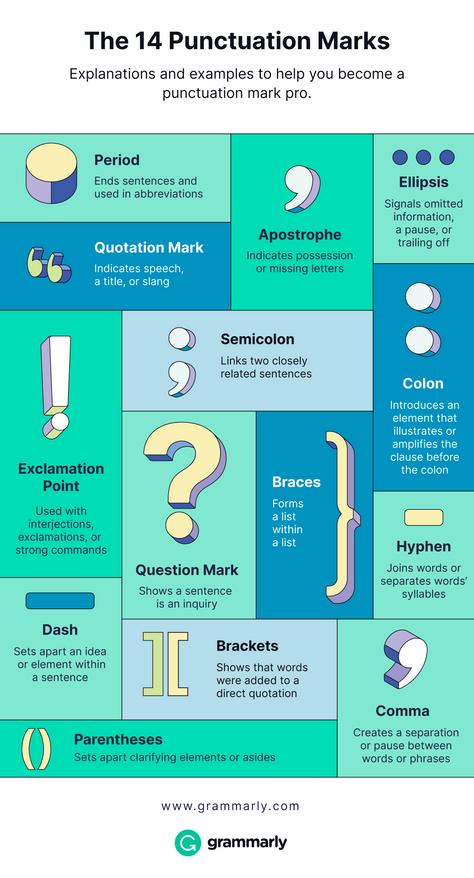
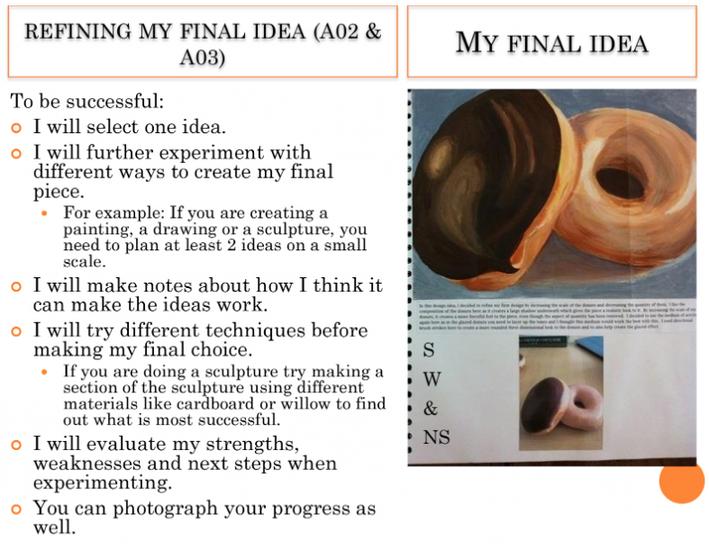
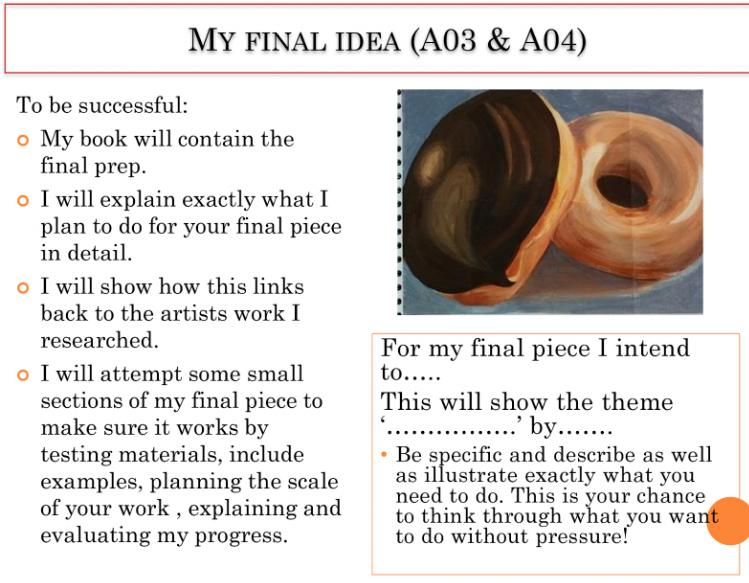
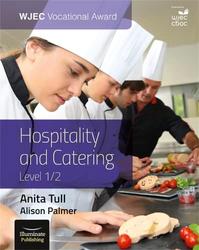
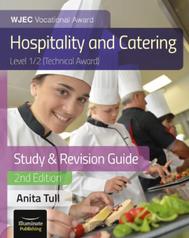
Having the text book and revision book will help you with your revision.
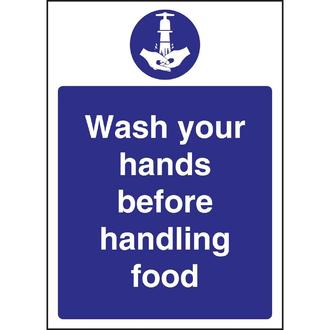
See Mrs Ford for work booklets, past papers and revision guides.
What's the best breakfast on exam days?
Research shows that pupils and students who eat breakfast perform better in exams For the best breakfast, include slow-release carbohydrates, such as whole rolled porridge oats, whole grain bread or low-sugar muesli, as they provide slow-release energy Add a protein food, such as milk, yoghurt or eggs, to keep you feeling full for longer On exam day aim to include a portion of a food rich in longchain Omega-3 fats, such as smoked mackerel, as they are believed to have brain-boosting properties
If you have revision books, flashcards etc - please make sure you use them and add to your revisions calendar.
SORT THE ASSESSMENT OBJECTIVES (AO) INTO SEPARATE SHEETS AS KNOWLEDGE ORGANISERS SO YOU CAN REVISE IN TOPIC CHUNKS.

D - Don't Rush remember
Keywords and their meaning.
Create your own bright, fun flash cards to help you revise.
C - Circle the common word
U - Underline key words
S - Scribble down points to cover
T - Think it through
A - Answer all the questions
R - Read your answer through

COMMERCIAL = for profit/make money
NON-COMMERCIAL = not for profit





RESIDENTIAL = you can sleep there
The commercial residential sector includes guest houses, hotels, B&B's, hostel and holiday parks. The non-commercial sector includes catering in business and industry, education, healthcare and the armed forces. These can be both residential and non-residential.
Watch TV programmes to help you with revision
The Hotel Inspector, Four in a Bed, Food Inspectors, A Very British Hotel, The Savoy, Hotel in the Clouds, Supersize Me Film, The Best Hotel in the World, The Billion Pound Hotel.

NON-RESIDENTIAL = no accomodation




This paper is 1 hour 30 minutes long and the total mark is 90. Use a highlighter to pick out key words. If a word is bold it is important.
Look at the command words and the number of marks available for each question, they will help you decide how much detail is needed.
Keep reading. Keep revising. keep calm. keep being you.
Key words and key features can be easily revised for and tested with, they are portable and you can share making them with a friend!
Revision Timetable
Create your own a revision timetable

Know the areas of Child Development (Skills)
1. Social/emotional
Get some coloured cards: On one side put a milestone that a child could reach - see examples. On the other side put what age they should reach that milestone and the area of skill.
Practise exam questions – Use past papers. Try to answer all the questions on a topic. Look at the questions you didn’t get quite right. Read that topic again and have another go. Keep practicing.
Mind Maps are great for revising topics - create as many as you can
2. Language/Communication
3. Physical/Movement
4. Cognitive/Thinking
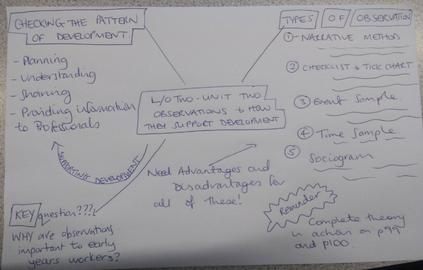
Revise with a friend - if possible, exchange ideas during revision - this can be very helpful to both people in understanding topics and building confidence.
Confidentiality
Routine Care Play Activity
Practitioner Placement Planning
Observation
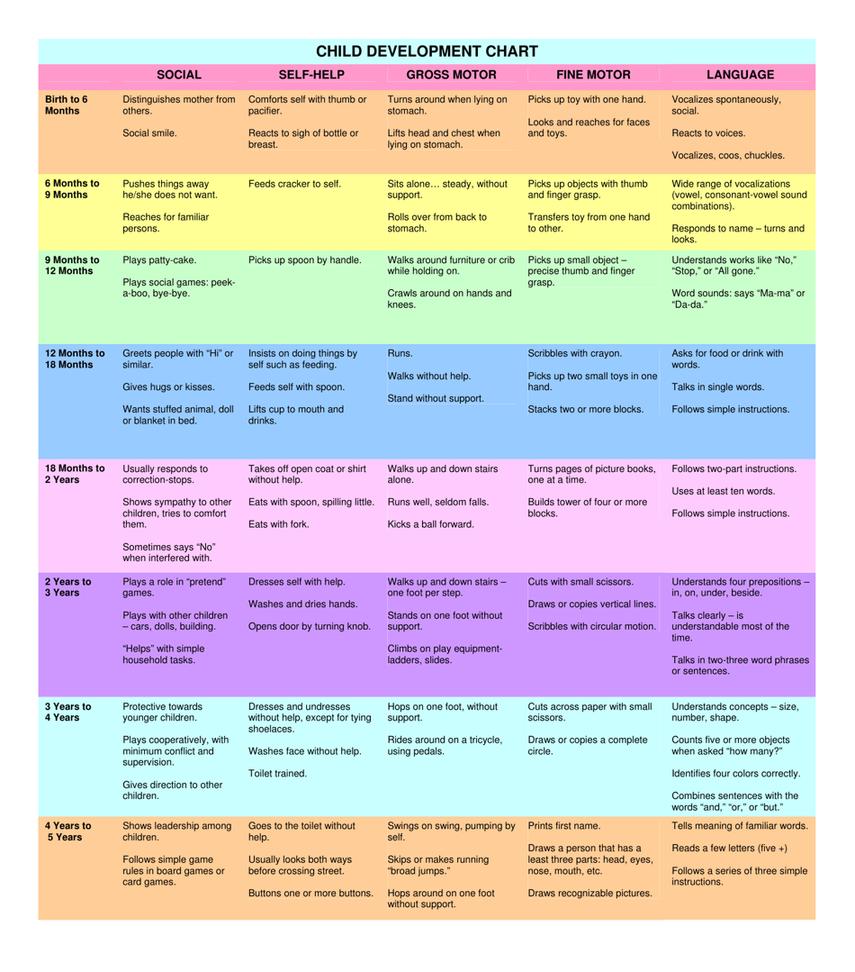
Revising isn’t something that should be challenging or difficult at all.
What revising is, unfortunately, is time consuming. It takes a while. That’s why you need to start early.
1. Get organised
Make sure you know what topics you are being tested on in which paper
Use a ‘topic checklists’ to organise your thoughts and revision material
3. Revision cards
2. Make sure you understand
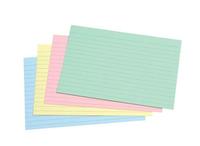
Condense your notes and information onto revision cards
Use different coloured cards to represent each topic or a different case study.

The first step in remembering anything is understanding it. These tips will help you with this: Find newspaper articles and pictures to give you some background and also extend your knowledge for top grades! Watch videos if they exist Check out parliament education and BBC bitesize for clips relevant to the course) For others there will be great video clips on YouTube to help you
If you can, visit the place Nothing is as powerful as this in fully understanding a place – E g our Westminster and Crown court trips
4. Mind maps
Organise your topic notes onto mind maps Aim for one topic per A3 page
5. Try to argue the alternative point of view. High achieving students are able to develop their own opinion but also consider the opposite viewpoint also Use stats and facts to support both sides
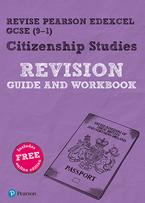
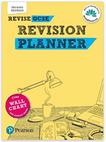
6. Revision books
Use the revision guides given to you
Your action project booklet is also a revision guide. Alternatively, you can buy the guides and planner from Amazon.
8. Exam command words
Understand the command words used in exams. What is the difference between a ‘describe’ and ‘explain’ question? See previous pages for exam command words.
9. Past papers
Make sure you are exam ready by practising to apply your knowledge to past questions.
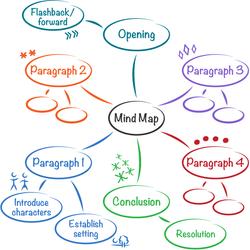
7. Memorise
Now you’ve condensed your class notes you need to memorise them. Good memorisation, in my experience, comes down to two things: Repetition and Using the information in different formats.
I’d advise you to do a combination of the following:
1
2
3
4
5
Read index cards out loud, cover and test yourself
Get other people to test you
Act it out
Make up songs or rhymes
Whatever else works for you
10. Analysing mark schemes
Analysing the mark schemes to understand what the examiners are expecting you to do.
IF YOU DON’T UNDERSTAND – ASK FOR HELP!
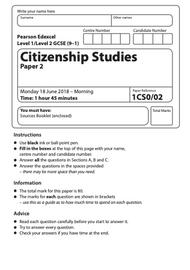
DOWNLOAD PYTHON AT HOME AND PRACTICE THE CODING, PRACTICE, PRACTICE, PRACTICE UNTIL YOU CAN DO IT WITH NO HELP.


For paper 1 do as many past papers as possible. Use the mark schemes so you can see what model answers look like. This is one of the most effective ways to revise.
Make flash cards of topics you know are coming up like Binary/HEX and Networks.
Use the Clear revise revision booklet you bought for quick revision, use the model answers from the back.
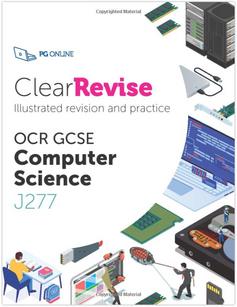
TAKE ADVANTAGE OF THE SCHOOLS TEACHICT MEMBERSHIP TO HELP YOU REVISE.
USER NAME: KT92JS
PASSWORD: chess1
Use youtube to help you understand some of the more difficult topics. There are excellent videos on there about sorting and searching, hardware and software, networks etc. Craig’n’Dave are your friends, their videos tell you exactly what you need to know for the exams.
https://student.craigndave.org/gcse-ocr-j277-computer-science-videos
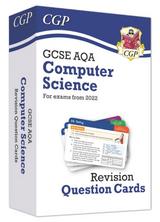
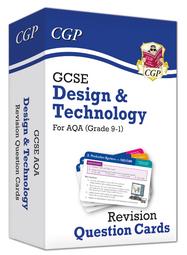
Use flashcards or make your own - buy the Clear Revise revision booklet and answer questions - Make quizzes using Quizlet - Do past exam papers and break down exam questions - Make a checklist of keywords and glossaries and translate into your language or organise in a way that helps you remember what they mean and which topic they are from - add images to help you remember.
We may forget information over time, by relearning them helps cement them in our mind Testing what you know is a powerful tool in revision, the effort to remember something really strengthens your memory Create your own tests, test yourself or get someone to test you, it works!
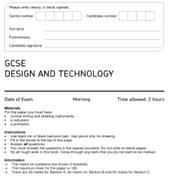
Use past papers to break down each question into detail. Look at the mark scheme so you know how much to write for each question
Create mind maps of what you remember on a topic
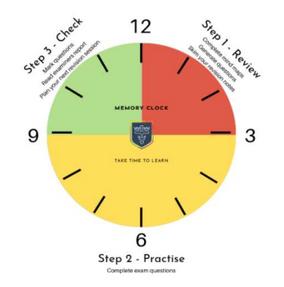
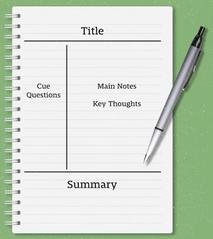
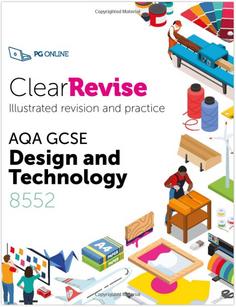
Read through each section in Clear Revise, then answer the questions at the end of each topic
Map out what you know on a topic so far before you revise it - then answer revision questions Use revision booklet 1-50 units and have a go at the questions / tasks again for each unit. Make a glossary of keywords and then find your answers in the text - revision sheet or google slide show on each topic.
Set aside time to practice improving your knowledge or D&T skills. Choose what you need to do, it must be tough enough to challenge you, and practice, practice, practice!
You should focus on something that you are almost able to do but not just yet!
MAKE DUAL CODING CARDS WITH PICTURES AND WORDS. DRAW OUT DIAGRAMS, TIMELINES AND FLOWCHARTS.
The Cornell Note Taking method discourages the use of long sentences It is about short notes that you write down in the right-hand column using recognizable abbreviations and symbols
Prior to the note taking, draw up a list of abbreviations and expressions This makes the note-taking process even easier
THE BASICS: ASK QUESTIONS. MAKE SURE YOU HAVE THE BOOKS, PAPERS AND REVISION BOOKLETS. GET SOME EXERCISE AND REST TOO
Plot?
Characters?
Key Scenes?
Actors names?
Themes?
Quotes?

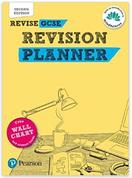
Can you analyse at least 3 key scenes and identify what skills the actors used to show the themes, emotions of the characters and style of the performance?
Remember you could be asked about any scene inthe play. You need to have an idea of how youwould successfully play EVERY character in the performance ensuring you are understanding the style of the play. What is needed to perform a farce? What makes it a farce?


Plot overview?
Characters?
Design Ideas?
Key Scenes?
Style?
Themes?
Quotes?
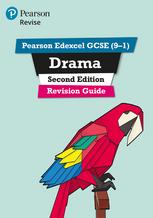
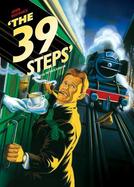
What terminology do we need to be using in our response?
Eyes:
Eyebrows:
Nose:
Mouth/lips:
Head: wide/narrow/closed/direction/lit up/stared raised/frowned/thrown flared/wrinkled pursed/pouting/pressednarrow/closed/smiled shook/up/down/turned away
Gesture: Posture:
Levels:
Arms: Shoulders:
Gait:

Proxemics:
Blocking:
Staging:
Tone:
rubbing hands/pointing/behind back/clenched fist/hand over mouth straight/slouched crouched/high/on level with ... folded/raised/behind back/relaxed hunched/straight/relaxed how did you move on stage? Consider position, speed and rhythm.
Pitch:
Volume:
Tempo:
Dialogue:
Pitch: High/low
Volume: loud.quiet/whisper/moderate
Qualities: Angry/happy/pleading/sarcastic/patronising/worried
Tempo: fast/slow
Dialogue: formal/informal/choral/speed
Qualities: annunciate/stressed/stacato
Levels: close to/far from (consider audience and actors) where on stage are you stood direct address/facing away from/position
what position where you in - how did this add to the level dynamic
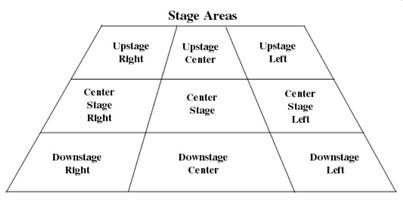
READ THE QUESTIONS CAREFULLY
REMEMBER TO ADD IN AS MANY INFERENCES AS YOU CAN IN THE S/S OF YOUR MESSIS!
USE EVALUATIVE VERBS AND ACADEMIC LANGUAGE TO IMPRESS THE EXAMINER
DO NOT SPEND MORE THAN 10 MINUTES (UNLESS YOU HAVE EXTRA TIME) ON QUESTION 2 AND 3 ON LP1
USE YOUR HIGHLIGHTER TO UNDERLINE KEY PARTS OF THE QUESTION AND FIND THE QUOTES YOU ARE GOING TO USE
PLAN WHAT YOU WILL WRITE IN QUESTION 5
REMEMBER TO USE AN INTERESTING STRUCTURE (A FLASHBACK?) TO KEEP IT EXCITING
DON'T GIVE UP – THIS IS A TRICKY EXAM - YOU CAN DO IT!
Watch Language Paper videos and make notes on each area. You could also watch suggested videos – Watch Mr Bruff’s videos: https://www.youtube.com/@mrbruff

Complete mock papers or mock questions to practise the skills you need to improve on. For example, if you struggle with Language Paper 1, Question 3 (structure, 8 marks) then ask your English teacher for a question to complete.
Highlight the most important parts of the question and quotes you intend to use
Read regularly – Read newspapers, magazines and articles (these can be online) to widen your vocabulary and see examples of great punctuation in use.
Practise exploding language quotes – Look out for language methods (similes etc) used in articles and explode (word classes, methods, inferences)/ mind map them.
Use evaluative verbs and academic words to improve your grade – You need to remember that the writer ‘clearly/ effectively/ successfully creates an atmosphere of This indicates
Language Paper 1 – 1 hour, 45 minutes
Question1: ‘Write down 4 things/ quotes’... (4 marks) You could practise reading extracts and writing a list of four things said in a paragraph. Also ask for a past paper.
Question2: ‘How does the writer use language to ’ (8 marks) You only have 10 minutes to complete this question Practise with a mock paper by highlighting the quotes you will use Give yourself only 10 minutes to write your 3 MESSIs – do not spend more time than that here Try MESSMESSMESSI to save time and increase marks.
Question 3: ‘How does the writer structure the source to interest the reader?’ (8 marks) You must revise your structural methods. You need to remember to discuss: the beginning, the change in focus and the end (is it cyclical?) Again, you are using MESSMESSMESSI Revise with a past paper and set yourself the same 10 minute time limit: no more! Highlight quotes you will use All I want to know is what are we focusing on and why are we focusing on it? No Language!!!!
Question 4: ‘A student said… How far do you agree with this statement?’ (20 marks) AGREE with the statement – it is easier. There are usually two parts to the statement, agree (either fully or partially) with both Go through and highlight quotes that you will use Begin your first MESSI with ‘I agree with the statement as the writer uses as ’ Remember methods here! MESSMESSMESSI x2
Question 5: Creative Writing question. (40 marks) You must PLAN this question. Your aim is to write at least 5 paragraphs of varying lengths. Remember ACCESSED and SPRAWLED (tick them off at the end of your writing). Show off your best language and punctuation. This is worth half the marks of the entire paper You must give yourself at least 45 minutes to complete this question
Language Paper 2 – 1 hour, 45 minutes
Question 1: Put a cross in the 4 boxes of the statements that are TRUE. (4 marks) You must mark 4 boxes Highlight to make sure you have got the correct ones,
Question 2: ‘Summarise the differences between source A and B’ (8 marks) Here you must write a summary, the examiner is checking you understand what the different sources are about. Write at least 2 PES/PES – there are no marks for methods here. Make sure you highlight quotes that you are going to use to show differences between the two sources. You can practise this by watching YouTube videos, completing mock papers or reading articles and spotting differences Spend no more than 10 minutes on this question
Question 3: ‘How does the writer use language to ’ (12 marks) Please see comments on language paper 1, question 2. This question is exactly the same – you ideally need one more MESSI as the question is worth 12 marks rather than 8. Spend no more than 15 minutes on this question.
Question 4: ‘Compare how the writers…’ (16 marks) You need to plan your answer to this question by finding quotes from both sources to compare Use comparison verbs like ‘In comparison ’ between MESSIs You must discuss methods You can practise this by watching YouTube videos, completing mock papers or reading articles and making comparisons. Spend no more than 20 minutes on this question.
Question 5: Creative writing: This could be a speech, letter, article, leaflet or essay and you are writing to present a point of view This question is worth half the marks of the entire paper so you must leave at least 45 minutes to complete You must plan this question and you should revise how to plan
Remember ACCESSED and SPRAWLED, AFOREST is also very helpful here too! Practise the planning and the writing of this question by completing mocks to time.
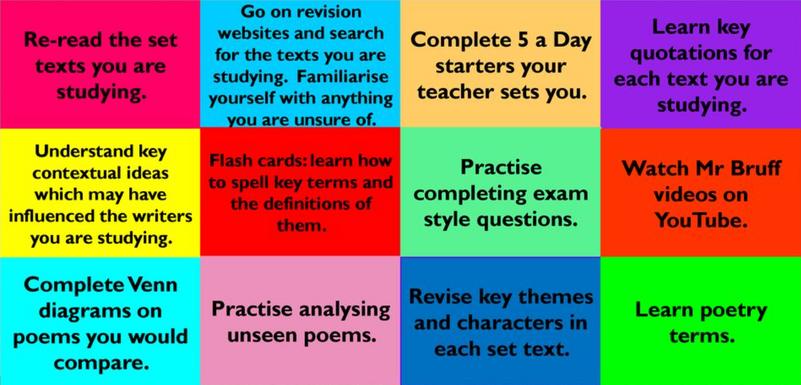

TOP TIPS & HELPFUL HINTS:
READ THE QUESTIONS CAREFULLY, USE YOUR HIGHLIGHTER
REMEMBER TO ADD IN AS MANY INFERENCES AS YOU CAN IN THE M/S OF YOUR PESMACS!
USE EVALUATIVE VERBS AND ACADEMIC LANGUAGE TO IMPRESS THE EXAMINER
WRITE A PLAN FOR EACH QUESTION WITH ALL THE QUOTES YOU WILL USE
LOVE AND RELATIONSHIPS POEMS: 2 FROM EACH CATEGORY!
LOVE: SONNET29, LOVE'S PHILOSOPHY, WINTER SWANS, SINGH SONG!
VIOLENCE: PORPHYRIA'S LOVER THE FARMER'S BRIDE DISTANCE: NEUTRAL TONES, WHEN WE TWO PARTED, LETTERS FROM YORKSHIRE
FAMILY: BEFORE YOU WERE MINE, MOTHER, ANY
DISTANCE, FOLLOWER, CLIMBING MY GRANDFATHER, EDEN ROCK WALKING AWAY
Watch videos about themes in each of your texts and make notes on each area You could also watch suggested videos – Mr Bruff’s videos are usually really helpful

Complete mock papers or mock questions to practise the skills you need to improve on. For example, if you struggle with Literature Paper 2, Section A (An Inspector Calls) then ask your English teacher for a question to complete.
Highlight the most important parts of the question and write down quotes you intend to use Re-read your set texts regularly – Read ther set texts again. You should be re-reading J&H, AIC and looking over the poems.
Practise exploding literature quotes – Look out for language methods (similes etc) used in articles and explode (word classes, methods, inferences)/ mind map them.
Use evaluative verbs and academic words to improve your grade – You need to remember that the writer ‘clearly/ effectively/ successfully… creates an atmosphere of… This indicates…
Literature Paper 1 – 1 hour, 45 minutes
Section A: Macbeth (34 marks) PESMAC – You must plan your answer. You should also be watching YouTube revision videos and making notes to make sure you understand the whole story of Macbeth If you have a revision guide – use it! Read through and make notes Then turn these notes into shorter notes. Then turn these notes into revision cards! Use the quote sheet to make sure you have revised as many of the 16 quotes as you can. You need to know the most important words and phrases – not necessarily the whole quote. Of course the best way is to complete practise exams See your English teacher for a question/ whole question paper
Section B: The Strange Case of Doctor Jekyll and Mr Hyde (30 marks) PESMAC – You must plan your answer. You must re-read this before the exam. It is very short and completely free to download on your mobile phone (try iBooks) or on Kindle (the app works too). Reading just a few pages a night will mean you have read it. After you finish reading, summarise what you have read. There are also quotes to learn for J&H – try to learn as many as you can, exploding them out is really helpdul You can also watch YouTube videos, use BBC Bitesize, revision guides or other websites Of course the best way is to complete practise exams. See your English teacher for a question/ whole question paper.
Literature Paper 2 – 2 hours, 15 minutes
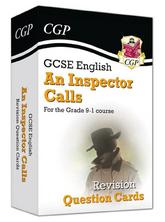
Section A: An Inspector Calls (34 marks) No extract, PESMAC: You must only answer ONE of the questions for this section. There will be two to choose from. Use the highlighter to make sure you know what the question is asking you. Plan your answer. Re-reading the play is the best way to understand the plot It can be downloaded on your phone, read online or you can buy/ borrow a text from the school. There are a lot of quotes to know here because there is no extract – start by learning the stage directions for each character. Then build up character quotes, beginning with Mr Birling. You should then explode the quotes to ensure you know the methods Remember that AIC is a play –Priestley uses stage directions, lighting, setting to have an effect on the audience Completing practise papers is the best way to revise. Ask your English teacher for a question.

Section B: Love and Relationships Poetry (30 marks), 1 poem printed in exam paper, PESMAC/PESMAC: One poem will be printed to help you Use the highlighter to make sure you know what the question is asking you. Plan your answer. You then need to choose a poem that answers the question to compare with the other poem. You must know quotes for the poems. Split the 15 poems up into categories (see my table below) You only need to know 2 poems from each category to make sure you have a poem to compare with – that is 8 poems rather than 15! YouTube videos, BBC Bitesize, online websites that analyse the poems are all useful to make notes with. Again, completing practise papers is the best way to revise
Section Ci: Unseen Poetry (24 marks) MESSI: An unseen poem (one we’ve never seen or studied) will be printed. You need to read the question carefully and then read the poem once to see what it is about. The second time you read it, annotate it for methods. Use the highlighter to make sure you know what the question is asking you Practising past papers is the best revision here
Section Cii: Unseen Poetry (8 marks) MESSI/MESSI: To revise this it is the same as above.
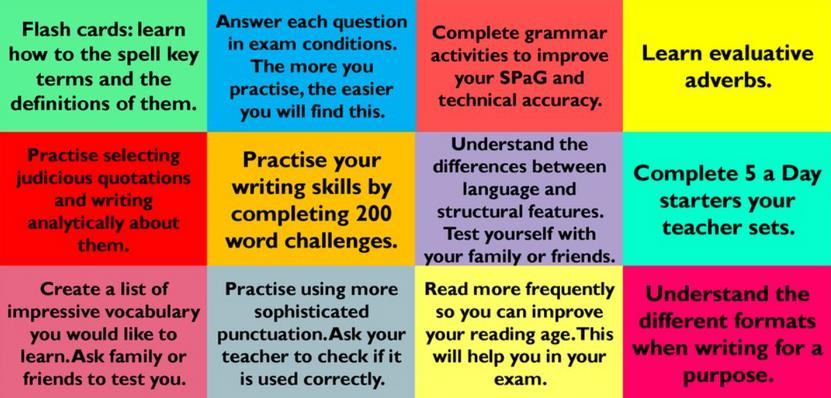
PastPapersandmarkschemes- theyareyourfriends
Haveyoueverriddenabikewithoutbeingonthebike?
Sohowcanyouknowhowtoansweranexamwithoutpractising doingone?
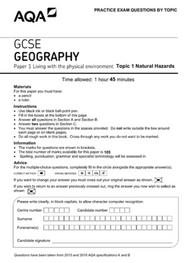
Try and answer as many past papers/ questions that you can – this will help you see what you need to do in the actual exam.
Mark schemes are just as important; look at what you have been awarded the mark for, could save time by writing less? Do you need to write more? The mark scheme will help you to answer these key questions
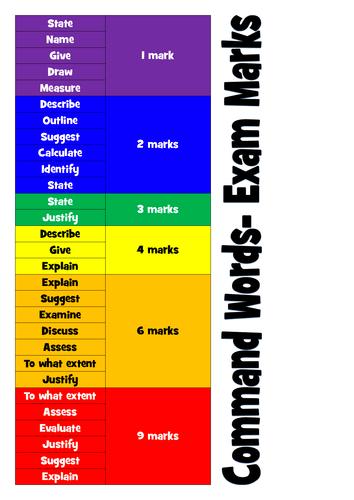
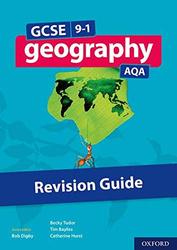
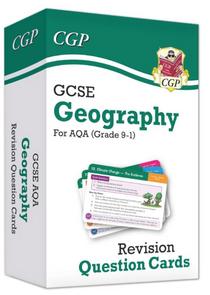
Command words are the words and phrases used in exams and other assessment tasks that tell students how they should answer the question.
Condense your notes and information onto revision cards
Use different coloured cards to represent each topic or different case study
Memorise! Read out loud, cover, test yourself Get others to test you Act it out – go on, you know you can be a volcano! Make up songs or rhymes
Mind Map it!
Why don’t you mind map your topics?
Allows you to add lots of information in a simplified way. You can visually see the links between topics and within topics.

Know your GEOGRAPHY command words!
Make sure you have a glossary of key terminology so you are able to identify what an exam question is asking and you are able to use it correctly in your answer.
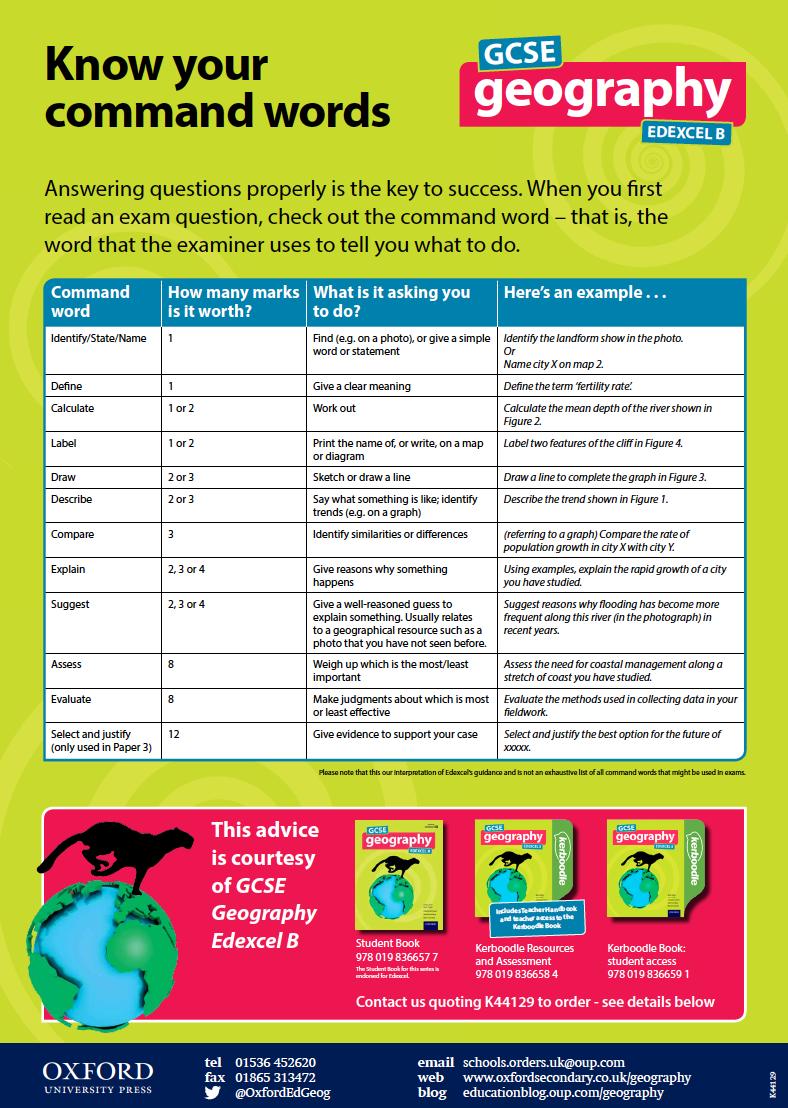
GET ORGANISED.
GET YOUR MATERIALS SORTED.
CREATE A REVISION CHECK LIST.
MAKE A REVISION TIMETABLE.
TAKE PROPER BREAKS.
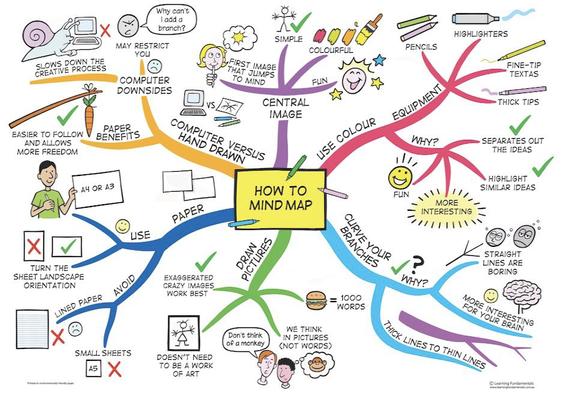

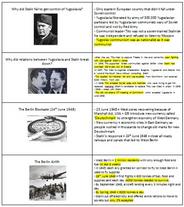
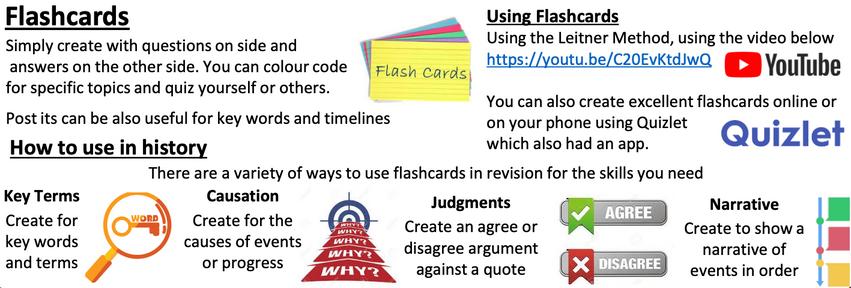

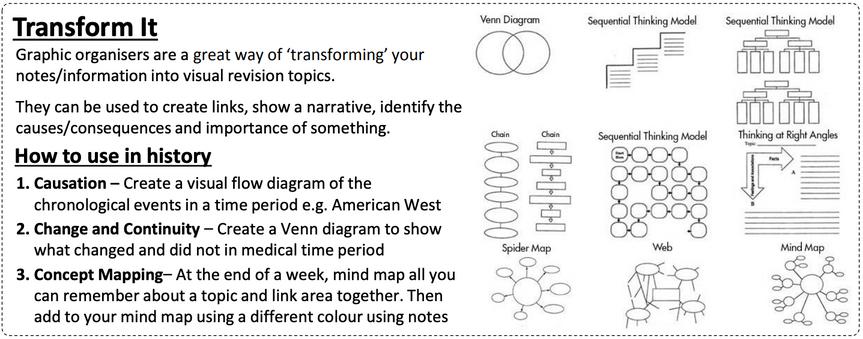

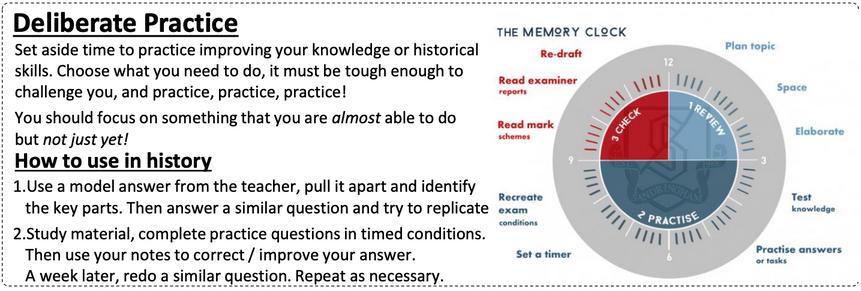
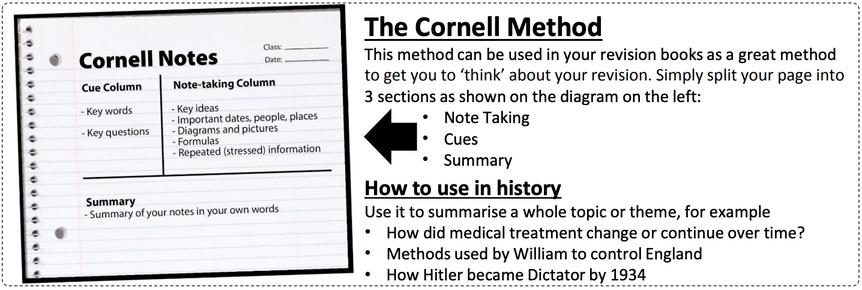

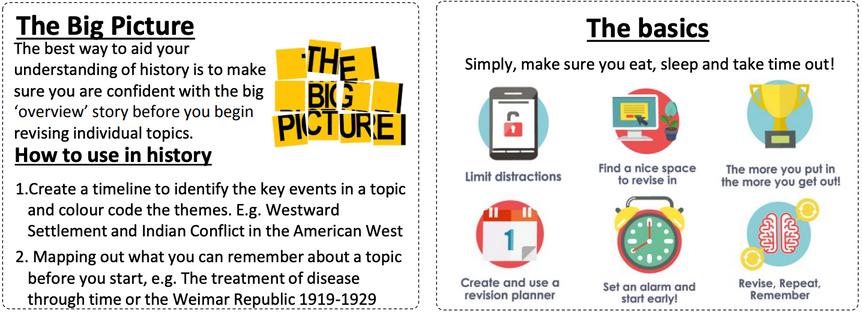

1. Don’t leave your exam practice until the last minute! Your brain needs time to create the neural pathways to store the new information. Practise every day: Speaking and writing the new structures and vocabulary daily for 20 minutes. The more you practice, the easier the words will roll off your tongue in the exam. Use mini-habits or the five minute revision challenge to turn this daily practise into a regular habit.
2. Practise exam-style questions
If you have to complete a gap-fill style task, practise gap-fill exercises. If you have to write a short letter on a particular topic, practice writing. If you have an oral exam, role-play it with a friend, memorize it, act it out and exaggerate! The stranger the better! You’ll be surprised how much you’ll still remember after your performance. Use the Revision Power Hour technique to get the most out of doing past papers.
3. Use a model answer. Get a model answer which achieved the grade you’re aiming for and find out what makes it a great piece of work. Note down all the features and use it as a model for your own work. Then you’ll have a good idea what examiners are looking for. Make sure you can show off these skills in your own exam.
4. Extend your vocabulary.
All language learned is relevant! Remember, I told you that you can’t simply ‘revise‘. Here is why: it really doesn’t matter if the topic didn’t come up in last year’s exam. You will be able to use almost any structure, vocabulary and expression in one way or another. There’s always more than one correct way to express an idea. The more language you have the better. The truth is it’s totally up to you how you express your ideas as long as you address the topic. And remember it doesn’t have to be true!
5. Use internet resources.
Immerse yourself in the language! There is a wealth of resources at your fingertips: Youtube, Podcasts, websites, games.
6. Use all the clues
Look at the headings, subheadings, pictures. They’ll all give you clues for understanding, the topic and type of vocabulary you can expect. If you come across a word or phrase you don’t know, please don’t panic! You don’t have to understand every word to understand a text. Often, you can guess the meaning of a word by reading its context.
¿hola, como estas?https://quizlet.com/subjects/languages/spanish-flashcards-519a58e6-t01
https://www bbc co uk/bitesize/subjects/z4dqxnb
https://quizlet com/subjects/languages/french-flashcards-297d486d-t01
https://www.bbc.co.uk/bitesize/subjects/z9dqxnb
7. Use music when studying vocabulary
No, not the TV! I´m talking specifically about Baroque music, which was composed between 1600 – 1750 and has a tempo of about 60 beats per minutes (bpm). Baroque music can cause anywhere from 25 – 400% increase in your learning. Up to 400%! Each frequency has a different effect on your brain. The optimal brain frequency for learning is Alpha. So, how to you get into the alpha state? The easiest way is to use Baroque music, which has a frequency of 60 beats per minute (bpm), harmonizes with your body and will help you get your brain into the alpha state. And keep it in this optimal learning state.

8. Revise in the same place
Do your exam practice always in the same area to use what cognitive scientist call context-dependent memory. Because the best place to remember something is where you first learned it. So in your exam, do a mental walk around the area where you practised for your exam. Or even better, do some practice sessions where you’ll sit your exam.
9. Use colour to aid your memory
Help your brain remember more by using different colours, e.g. verbs pink, prepositions yellow, nouns with articles on blue. When you’re thinking about it in the exam, you’ll be able to automatically recall the colour of the card and the matching vocabulary you need. Make sure you organize them.
10. Record yourself speaking

Firstly, to listen to yourself speaking the foreign language, and correcting your pronunciation when necessary, but also because you can listen to and read your notes at the same time. This way you’re using two modalities – listening and reading – at the same time, which will increase your retention. Use online dictionaries like ‘wordreference’. HTTPS://WWW.WORDREFERENCE.COM/
Like any skill, Maths is a practical subject that needs to be practised if you want to improve. Watching videos and reading revision guides will not achieve much if you’re not using the skills you’re reading about.
Everyone is capable of making progress and improving at maths It just takes time and effort, and with all the other subjects, too, you will need to be organised and disciplined.
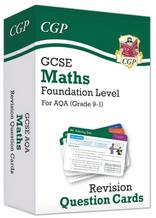
Inevitably, there is some stuff in maths that you just need to learn and remember, such as exact trig values, angle facts and formulas for area and volume We all remember things differently, but you could try the following:-
Flash cards – fact on one side, description or clue on the other. Test yourself, test your friends, get your friends and family to test you. Make it competitive.
Posters/diagrams – put families of facts into spider diagrams or posters, eg formulas for area (triangle, trapezium, circle etc ) Make them visually memorable to help recall and post them strategically around the house, eg circle theorems on the fridge
Whatever way you choose, it is important that you repeat your learning, testing yourself at regular intervals to embed the knowledge for natural recall come the exams.
Inevitably, there is some stuff in maths that you just need to learn and remember, such as exact trig values, angle facts and formulas for area and volume. We all remember things differently, but you could try the following:-
Flashcards – a fact on one side, description or clue on the other. Test yourself, test your friends, and get your friends and family to try you Make it competitive
Posters/diagrams – put families of facts into spider diagrams or posters e.g. formulas for the area (triangle, trapezium, circle etc.). Make them visually memorable to help recall and post them strategically around the house e.g. circle theorems on the fridge.
Whatever way you choose, it is essential that you repeat your learning, testing yourself at regular intervals to embed the knowledge for natural recall come the exams
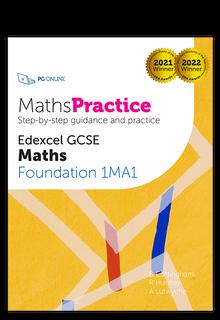
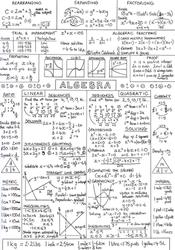

Attempt the paper or part of a paper Try to stick to timings (about 1 minute per mark is a good benchmark). Take a break. Use the mark scheme to mark the questions – don’t just look at the answers, look at where the marks are awarded to give you a good idea of what the examiners are looking for. If you have got questions wrong, ask yourself first whether you understand your error. If so, make a note to go back to the question in a future session and repeat it If you don’t understand the error, look up the topic in your revision guide or on Mathswatch and go through it. Attempt the question again immediately. If you still can’t see where it went wrong, ask your teacher either in class or at a revision session
Use the "independent learning" section to target weaker topics from your mocks. Make sure the course is set to "GCSE". You can change the question difficulty to 1-5 but it will automatically pick where it thinks you are. You can watch the videos if not sure and the XP boosts are great to consolidate your learning
You may want to focus on specific topics in your revision, in which case Mathswatch and/or revision guides should be your first port of call.
Watch the video/read the section
Mark them
Do the practice questions
If necessary, repeat the process
There are other sources of topic-based revision resources on the internet, some of which are outlined in the next section. Remember, if in doubt, ask your teacher.
Revision guides – there are many available and all have their merits. If you purchase one, ensure that it supports the Edexcel 9-1 GCSE and includes plenty of practice questions. Some guides have separate practice books.
Mathswatch – everybody has access to Mathswatch. As well as the full length teaching videos, there are short one minute refresher videos and online practice questions. It is a brilliant resource, so make good use of it.
Other websites – there are many, but particularly good ones for access past papers and practice questions are corbettmaths.com (5 a day is good general practice), mathsgenie.co.uk and mrbartonmaths.com
FIND THE TIME AND THE PLACE
Find the time and the way you prefer to listen to the 8 set works as much as possible, whether it is on the bus with headphones, watching a revision video in the library or simply listening to the pieces at home, and even if you are doing something else The brain need time to memorize the structure, instrumentation and musical features
The more you hear them, the better you will get to know them, possibly even off by heart This is useful in an exam when an extract is being played and you can kind of “hear” it in your mind afterwards
Looking through lesson notes, written tasks and revision poster. While we were studying the pieces during the year, we write all kinds of points about melody, harmony, structure etc. It’s really useful to quickly see what happens where and follow through the score while listening to the pieces.
Practice questions. Go through the homework you have completed or you are still working on, you will see all the resources and papers to fill in and mark. Focus also on the 12 marks questions. It is a big part of the listening exam.
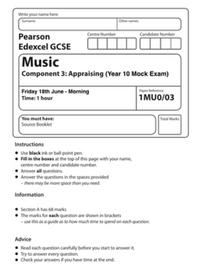
BE PROACTIVE, FIND YOUR WAY, YOUR SITE, YOUR FAVOURITE RESOURCES
Thestudentroom.co.uk
Bbcbitesize.co.uk Youtube tutorials and revision video. BBc IPlayer/Music
MIND MAP:
Most topics are related and they use the same musical elements
Remembering the musical elements and the musical features for one topic will allow the brain to apply the same critical analysis skills to all the set works
Checking the connections between composition and listening through the mind map will be useful to remember more necessarily needed details in your exam paper

TEXT BOOK:

Use the textbook to check the background context of each set work. The analysis we do in class is well explained in the book with some annotations of the score, It is also graphically helpful with that layout and the key words on the side.
CHECKLIST: YOU WILL DO WELL IF YOU KNOW/REVISE:
The musical elements: dynamics, tempo, pitch… and so on
The Musical instruments
The typical structure of the different genres
The Artists and their background (watch the suggested documentaries, short movies and, wherever possible, the live performances to familiarise with the artists). Some positive focus on Music theory and notation, to avoid feeling worried about not being a great music notation specialist.
Simply create with questions on side and answers on the other side. You can colour code for specific topics and quiz yourself or others. Post its can be also useful for key words and labelling structures. Keywords: Simply write the keywords associated with each topic on the front, followed by the definition on the back.
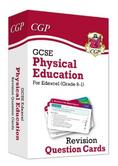
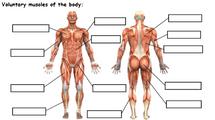
On one side, draw/stick down relevant images associated with any topic. For example body structures i e unlabelled heart etc or particular assessments/methods etc On the other side, names of these structures/assessments etc You could challenge yourself further by rehearsing protocol and how this links to exercise performance.
Create 2 piles of cards, one with random sports and the other with names of topics or keywords. Select one card from each pile at random. You would need to test yourself to see if you can write sentences based on how the 2 link.
Assessing yourself to see how much you know about a topic and specifically looking at content that you have missed.
Select a topic- You could be broad e.g. the physical training topic or narrow ie Components of Fitness. From this topic, write as many things as you know. This could be definitions, sporting examples, explanations etc. When you have exhausted your mind, look back at the information using your book/revision guides and write out all that you missed in a different colour pen. When you have finished repeat the process. You should find that you are able to remember more the second time around. Repeat as often as is necessary until you can recall all info!
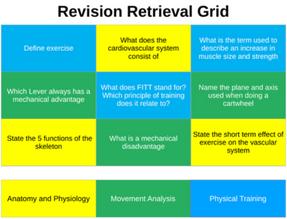
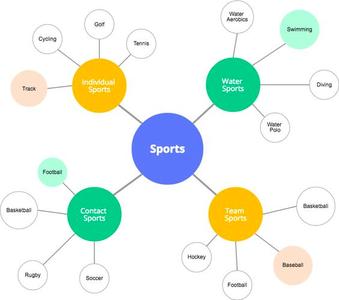
Dual coding’ is the method of putting your knowledge into visual form alongside words. It increases the chances of you remembering it.
1. Use simple drawings with matching simple descriptions
2. The drawing should represent your understanding of the topic
A fun way to use this could be as a storyboard to show different processes in sport. For example the pathway of blood to the heart or a story about socio economic differences and its influence on sports participation
Ask your teacher to design some exam questions for you or print off copies of previous exam questions. Attempt these questions without help using 1 colour pen and then add more information using your book/revision guide in a different colour pen. Ask your teacher to mark/ provide a mark scheme for you to gain experience in what is expected of you. If you have lost marks; use a third colour pen to add final information to ensure you have a full answer.
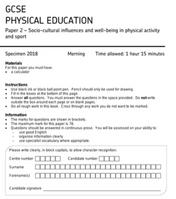
A lot of the things you learn about in PE can be done physically. How about taking time out to actually bring some of the content to life.
Play 11 different sports that allow you to focus on each different component
Complete all 15 fitness assessments that you need to know
Attempt all 8 methods of training that you need to know
Attempt skills that suit different classifications
Coach different sessions using the different styles of feedback
Create a session plan applying different types of practise and applying principles of training
Although the largest question is worth 9 marks, why not get used to writing as much as you can about topics by creating essays
Introduce the essay with a brief summary of the keywords associated with the topic
Write a paragraph about each keyword associated with your topic.
In PE you often have to provide definitions, explanations and links to sporting examples.
Attempt this for each keyword For example a “health” essay might provide definitions, explanations and examples of each of the 3 types of health
Conclude by stating how the key concepts overlap and link or how they contrast.
Create your own exam questions using the following command words.
Link these to all keywords relating to topics you are struggling with -
Describe - Give a description of
State - Name or list
Outline - Briefly list the features
Identify - Select 1 option/ name
Explain - Give reasons why something is as it is
Justify - Reasons why something is valid/ why you chose something
Compare - Identify and explain similarities and differences
Discuss - Give reasons/ present facts about something and explain
Summarise - Give an account of the main points
Interpret - Make a judgement about something
"IT’S ALL
ANYTHING IS POSSIBLE.”
Create a page of definitions associated with each topic
Test yourself to see how many definitions you can recall
Attempt to apply sporting examples to each keyword
Write down how the keyword influences ones health, exercise, fitness and/or performance ability.
The first step to remembering is understanding Teachers are your biggest tool
Make sure that you ask for any modules/resources that you might have missed – your teacher will give you these. Intervention – Monday F4 @ 3pm
Sessions will be based on topics that you want to revise –go along to these sessions as you will revisit key skills, practice exam questions, and pick up top tips for the exam – did you know that some answers are already in the paper? You just need to know how to find it!
Past Papers and mark scheme they are your friends
Have you ever ridden a bike without being on the bike? So how can you know how to answer an exam without practising doing one?
Try and answer as many past papers/questions that you can –this will help you see what you need to do in the actual exam in the Summer.
Mark schemes are just as important; look at what you have been awarded the mark for. Could you have saved time by writing less? Do you need to write more? Did you lose marks due to not reading the question correctly? The mark scheme will help you to answer these key questions.
Condense your notes and information onto revision cards
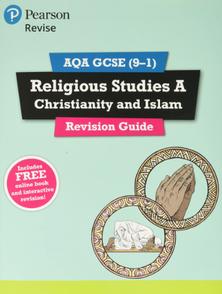
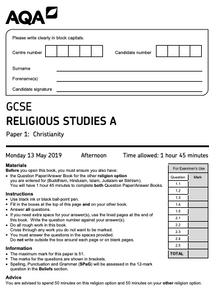
Use different coloured cards to represent each topic or different case study
Memorise! Read out loud, cover, test yourself
Get others to test you
Act it out
Make up songs or rhymes
Mind Map it!
Why don’t you mind map your topics? Allows you to add lots of information in a simplified way.
You can visually see the links between topics and within topics.
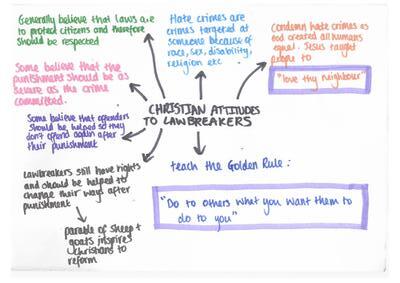
Know your exam questions!
First questions asks a definition – make sure you know your key words!
Create a list of the words and write down in your own words what it wants you to do!
Remember that Contrasting is opposite
BABA – BELIEF/ACTION/ BELIEF/ ACTION
PDPDQ – POINT/ DEVELOP/ POINT/ DEVELOP/ QUOTE
MAKE SURE YOU KNOW SOME KEY QUOTES FROM BOTH THE QUR’AN AND THE BIBLE
FFAACE / PEEL – FOR/ FOR/ AGAINST/ AGAINST/ CONCLUSION/ EVALUATE - USING POINT/EVIDENCE/ EXPLAIN AND LIN
Furthermore
In addition
Convincingly
A strong argument is A weaker argument is
This means that This evidence is convincing because Consequently
Similarly
In contrast
Despite this Of less importance
Most importantly
As can be seen by
Finally

Get organised revision check list revision book text book revision planner flash cards
BBC Bitesize
Identify the gaps in your knowledge
Where are the gaps?
What are you confident with?
What do you need to go back to?
What do you need to study more?
It’s important that you make your revision as ACTIVE as possible. Don’t just read through your notes – do something with them.
On one side of your flashcard, write the question. On the other side, write the answer in bullet points. For example:
Why does the reactivity of group 1 metals increase as they descend (go down) the group?
Atom size increases
Distance between nucieus and outer shell increases
So the force ofthe attration decreases
Outer electron easily lost
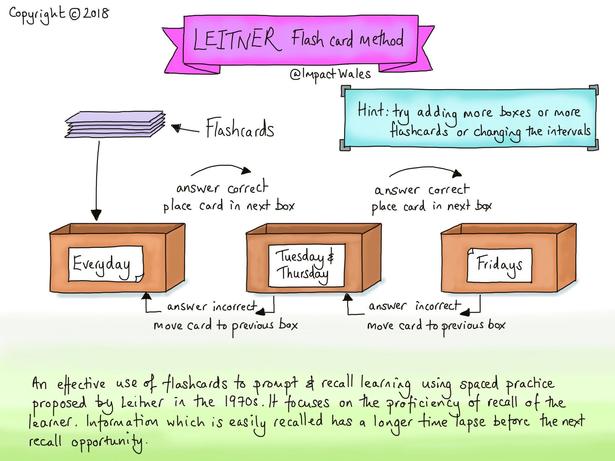
To watch a 3 minute YouTube video on FLASHCARDS - scan the QR code
Watch the YouTube video that explains the Leitner flash card system. Use the flash cards to regularly revisit topics. Ask yourself the questions then say or write down your answer. Use the answer on the back to check your understanding. If you got it correct, place the card in the ‘secure’ pile, if it was incorrect place it in the ‘insecure’ pile. Once you have worked through all the cards, revisit the insecure pile until they are all on the secure pile.
Use past papers and mark schemes available to familiarise yourself with examination style questions. Complete the questions and then use the mark schemes to correct your work. Focus on what the marks are awarded for and the key terminology examiners look for. Or bring in for your teacher to mark.
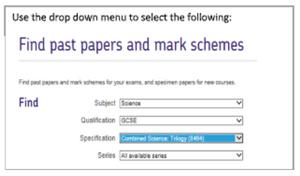
Look, Cover, Write, Check
Read a piece of information from your revision guide/notes
Cover it with something
Try to write it down accurately from memory
Check against the revision guide, correct errors and fill gaps
Repeat until you can write the information down accurately.
Other Resources - scan the QR code to go to the website
Websites – BBC Bitesize, Seneca, GCSEScienceRevision.com
YouTube – Free Science Lessons, Cognito, Fuse School
Instagram - @HuddiesStudies
Apps – PhysQuiz, BioQuiz, Quizlet
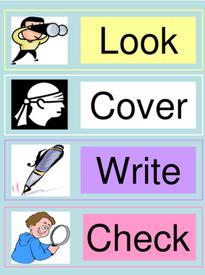
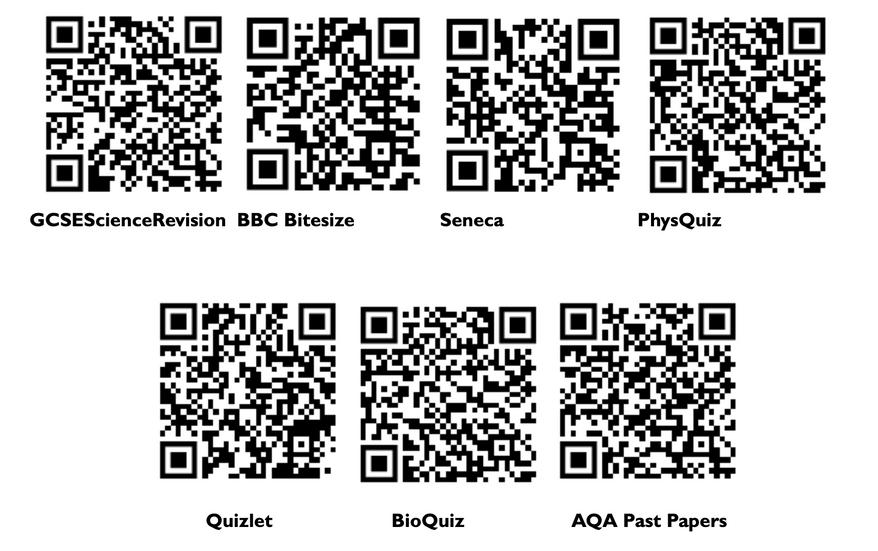
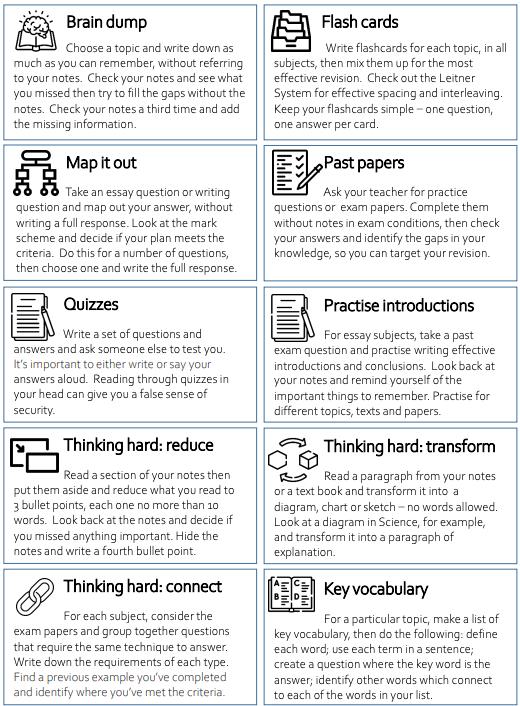
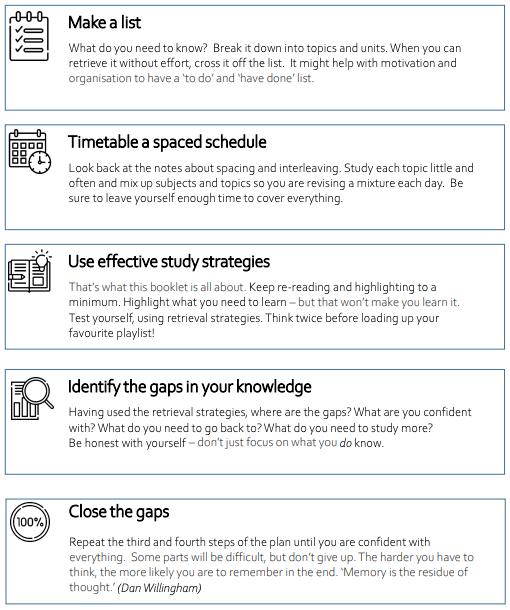
It's what this whole book has been preparing you for - the big exam day However, to ensure you're in tip-top exam-slamming condition, here are some last-minute things you can do.
1.
Eat a balanced meal the night before.
2. Double-check where and when your exam is.
Get anything you're taking into the exam ready to go.
3.
Do something relaxing or some gentle exercise.
4. You could read over some notes but don't cram all night.
6.
5. Try to get a good night's sleep.
1.
Give yourself time to wake up and get ready.
Don't forget to set an alarm clock!
Eat a healthy breakfast, eg bowl of cereal, porridge, toast and jam, and water.
2. If time, look over your notes at any key definitions, formulas, facts and quotes.
4.
3. Don't revise anything new - save your energy for this exam!
Leave home with more time than you need to get to your school / exam
Try not to arrive too early - you don't want a long nervous wait.
Feel confident that you have prepared and revised.
Keep calm and stay focused.
Make yourself comfortable at your exam table and chair.
Try not to drink too much water, small sips is good to keep hydrated.
If people outside the exam hall seem stressed when you arrive, try to stay calm and move away from them, don't let their worries affect you. It's okay to be left alone before an exam if that's what you need to be mentally prepared.
Exam Kit Checklist
Pens and Pencils
Rubber and Sharpener
Clear pencil case
Clear water bottle
Subject specific stationery - eg, ruler, scientific calculator etc.
“EVERY MORNING YOU HAVE TWO CHOICES: CONTINUE TO SLEEP WITH YOUR DREAMS, OR WAKE UP AND CHASE THEM.”
When you walk into the exam room or hall, imagine an orchestra playing a dramatic theme to the climax of an epic movie - that's what this is, the finale!
While you are waiting for the exam to start:
your pens and stationery out.
THE ROLE OF THE EXAMINATION INVIGILATOR IS TO ENSURE THAT EXAMINATIONS ARE CONDUCTED ACCORDING TO THE EXAM BOARDS INSTRUCTIONS
If you can't answer a question - move on to the next question and come back to it later.
If you realise halfway through a question that you have got it wrong - cross out what you have done and write your new answer beneath it. Don't panic.

If you're running out of timeAnswer questions which require short answers to pick up as many marks as possible.
Don't get distracted or worry about anyone else in the room
- concentrate on you.
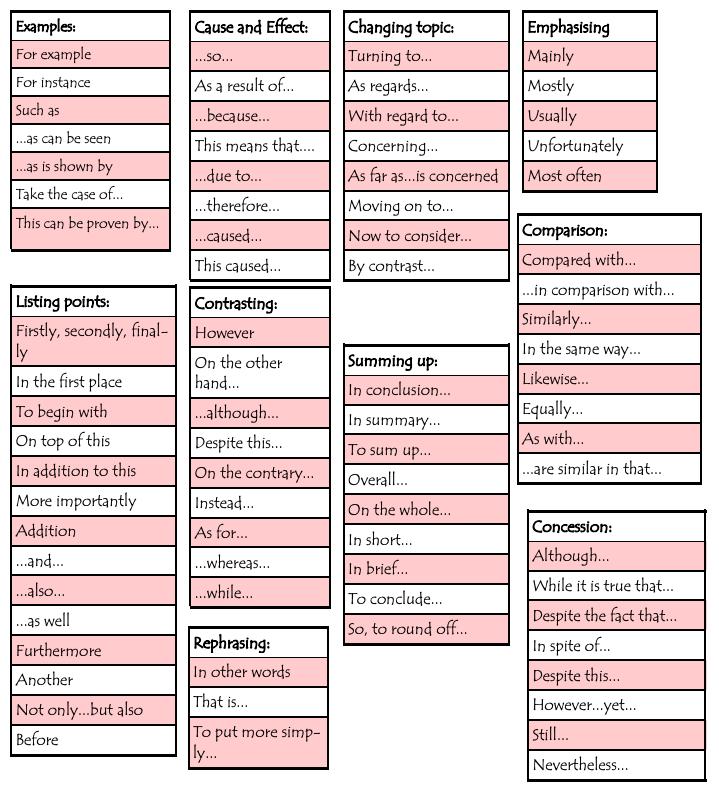
Whether it's your first exam or fifteenth, and whether you think it went well or not, congratulate yourself on getting a step closer to the end!

1. Store your revision notes (but don't throw them away).
Be proud that you have ticked off another exam from the list.
2. Celebrate your hard work!
3. The last day is not far off! 4
WORK HARD AND BE PROUD OF WHAT YOU CAN ACHIEVE.
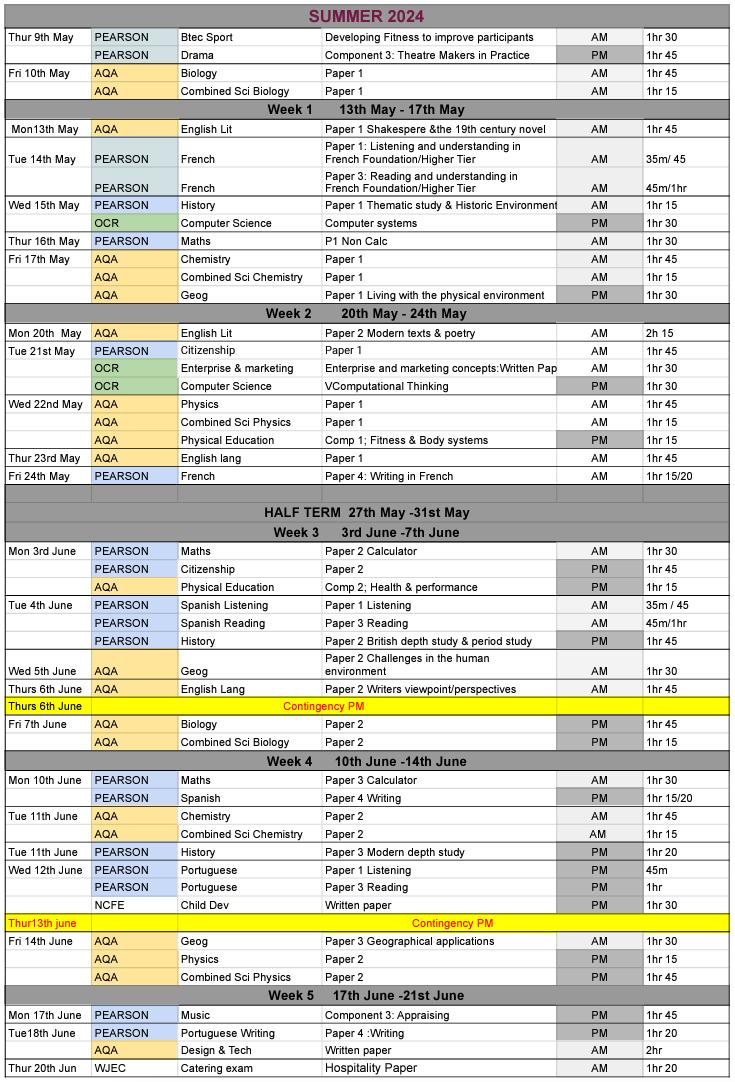
Write down the dates/times when all your exams are and which subject.
1. Break each subject down into topics - ask your teacher for the list of topics.
2
3. Make sure you do enough revision and practice.
Put a tick in the column once you are happy you have revised it in full
5.
4. Don't forget to add a tick every time you move from 'unsure' to 'happy' with your topic revision.
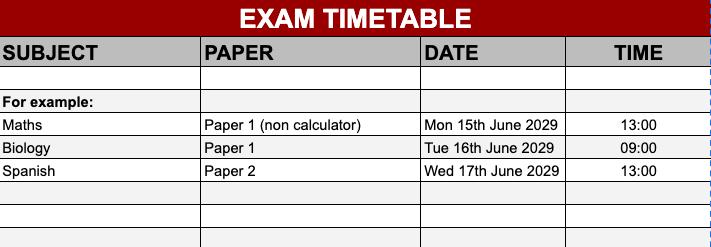
The link to these Google sheets is here - make a copy and use it to enter your own plans.
HTTPS://DOCS GOOGLE COM/SPREADSHEET S/D/1PCAN0FG3TVDE88YU 5G3QEHLKXDF1D 1BVRF2HZEFMX8/EDIT?USP=SHARING
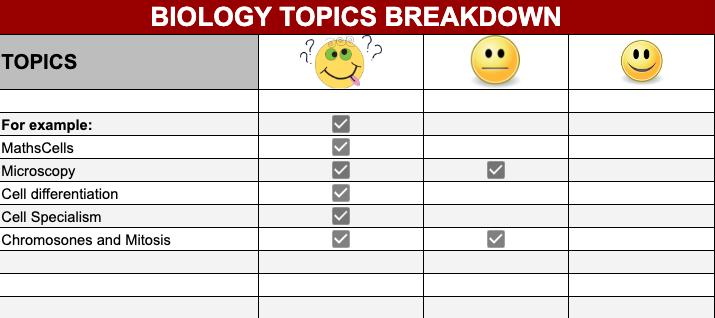
You can use your school's Google Calendar. It is good to have a digital calendar as you will be making edits along the way plus you can access it from any device. Download the Google calendar app if you don't have it.
Consider which GCSE grades you need to get onto the sixth form or college course you have chosen.
15. With that information in mind, work backwards from each exam date and add in revision slots. 16.
17
18.
Work out what to actually revise in each of those revision slots.
Make your timetable achievable by managing your downtime, time to look after yourself and your mental health.
19
Be as organised as you can be and stick to the timetable if possible.
There are no definite hours or times to revise, you know what effort you need to put in for revision and practice papers.
20. Alternatively, you can buy a paper diary and block out the same as above manually.
Managing your revision time on paper or digitally will keep you focussed and organised.
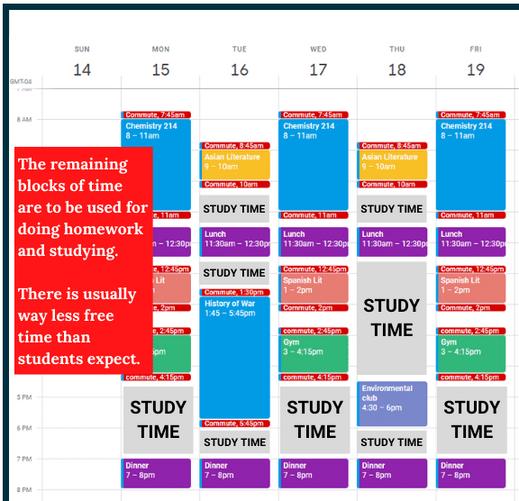


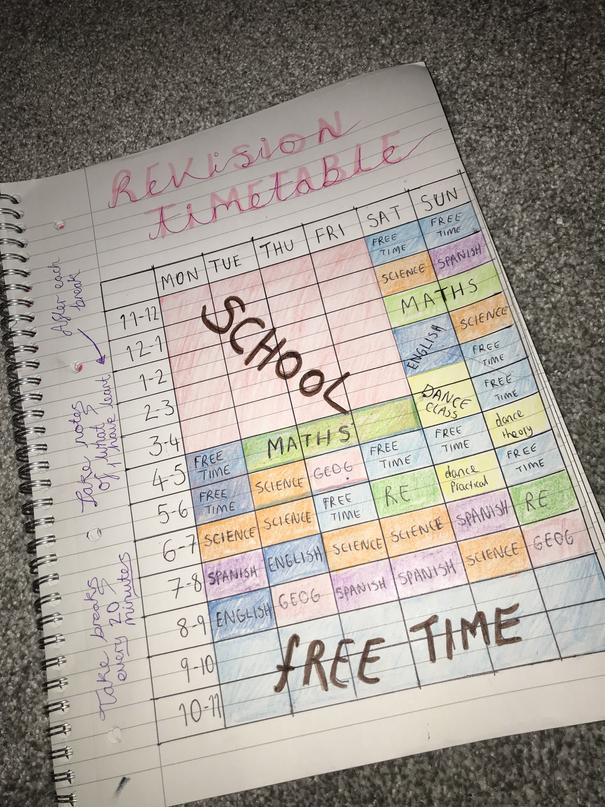
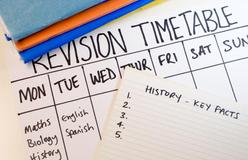
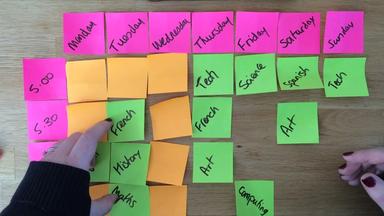
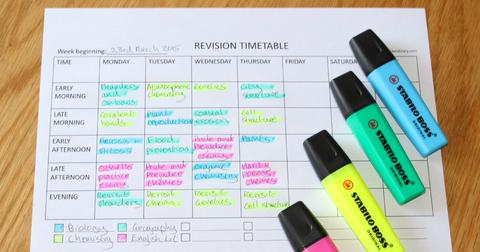
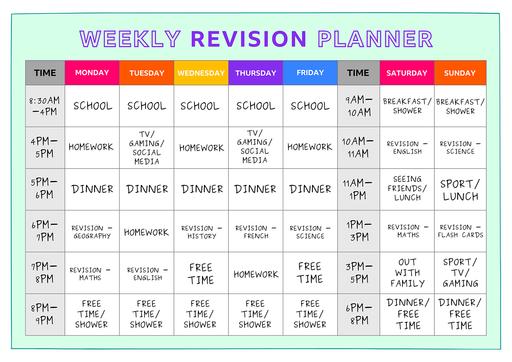
Timetable
Revision
C r e a t e y o u r o w n r e v i s i o n t i m e t a b l e . Y o u c o u l d u s e c o l o u r t o i d e n t i f y i n d i v i d u a l s u b j e c t s . R e m e m b e r t o p l a n f o r s e n s i b l e b r e a k s , d r i n k l o t s o f w a t e r a n d h a v e h e a l t h y s n a c k s t o h a n d . 9 a m 1 0 a m
M o n T u e s W e d T h u r s F r i S a t S u n S u b j e c t S e s s i o n s p e r w e e k
1 1 a m
1 2 p m 1 p m 2 p m 3 p m 4 p m 5 p m 6 p m 7 p m 8 p m

START REVISING AS SOON AS POSSIBLE
SET UP A TIDY QUIET STUDY SPACE
PLAN YOUR REVISION USING A TIMETABLE
REVISIT TOPICS SEVERAL TIMES

VARY YOUR REVISION WITH DIFFERENT ACTIVITIES
DO LOTS OF PRACTICE PAPER AND QUESTIONS
SET ASIDE TIME TO DO FUN THINGS
KEEP YOUR PHONE AND OTHER DISTRACTIONS AWAY
SLEEP AND EAT PROPERLY
DON'T PANIC!
PLAN YOUR WORK AND WORK YOUR PLAN









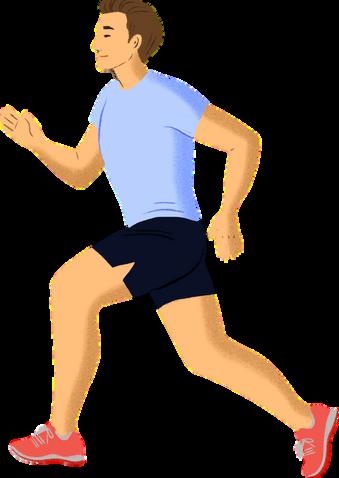







https://www.chessington.kingston.sch.uk/